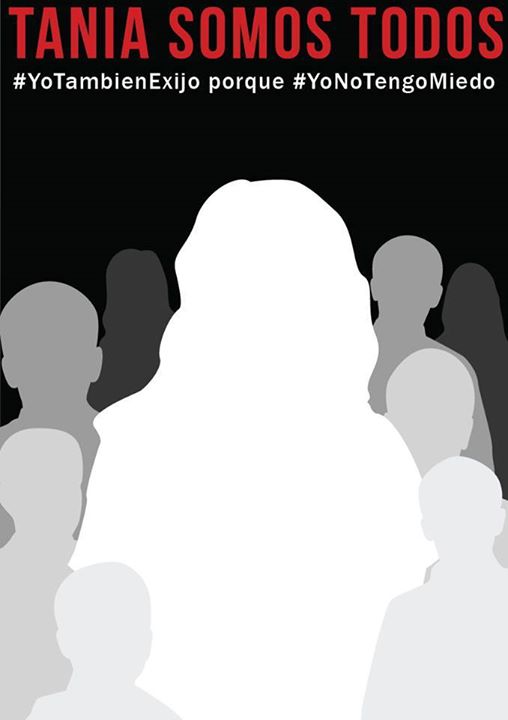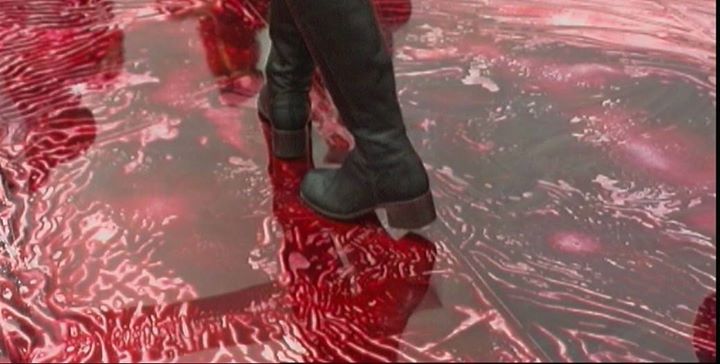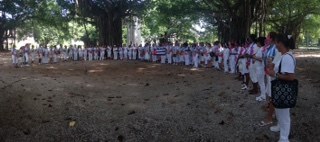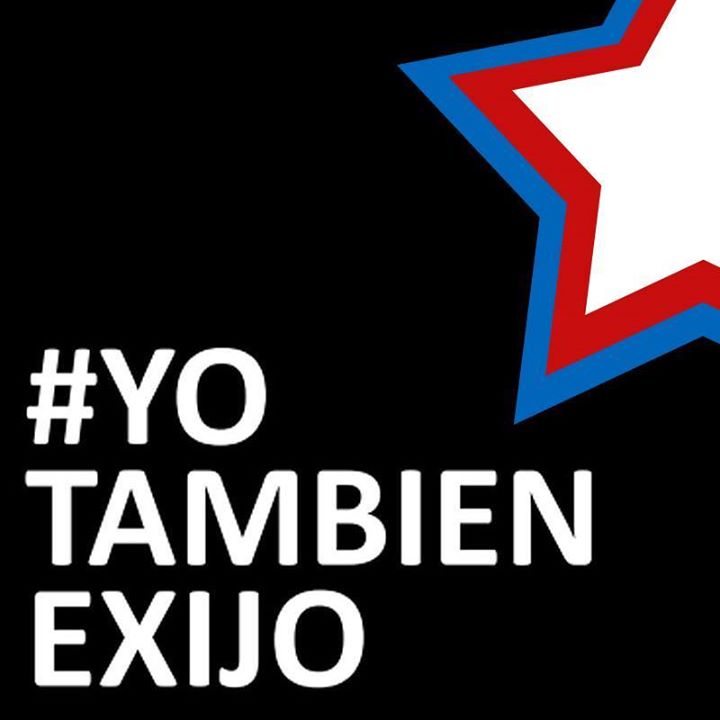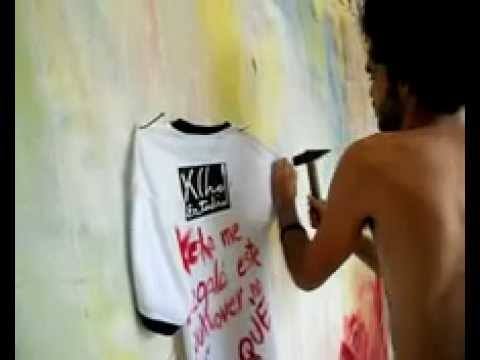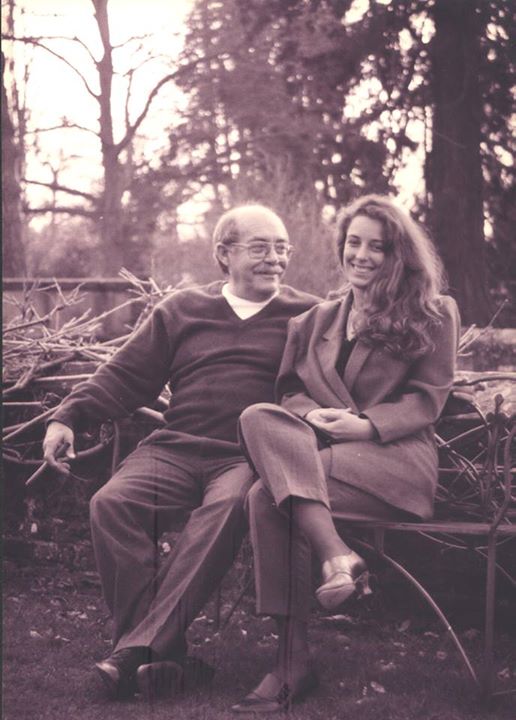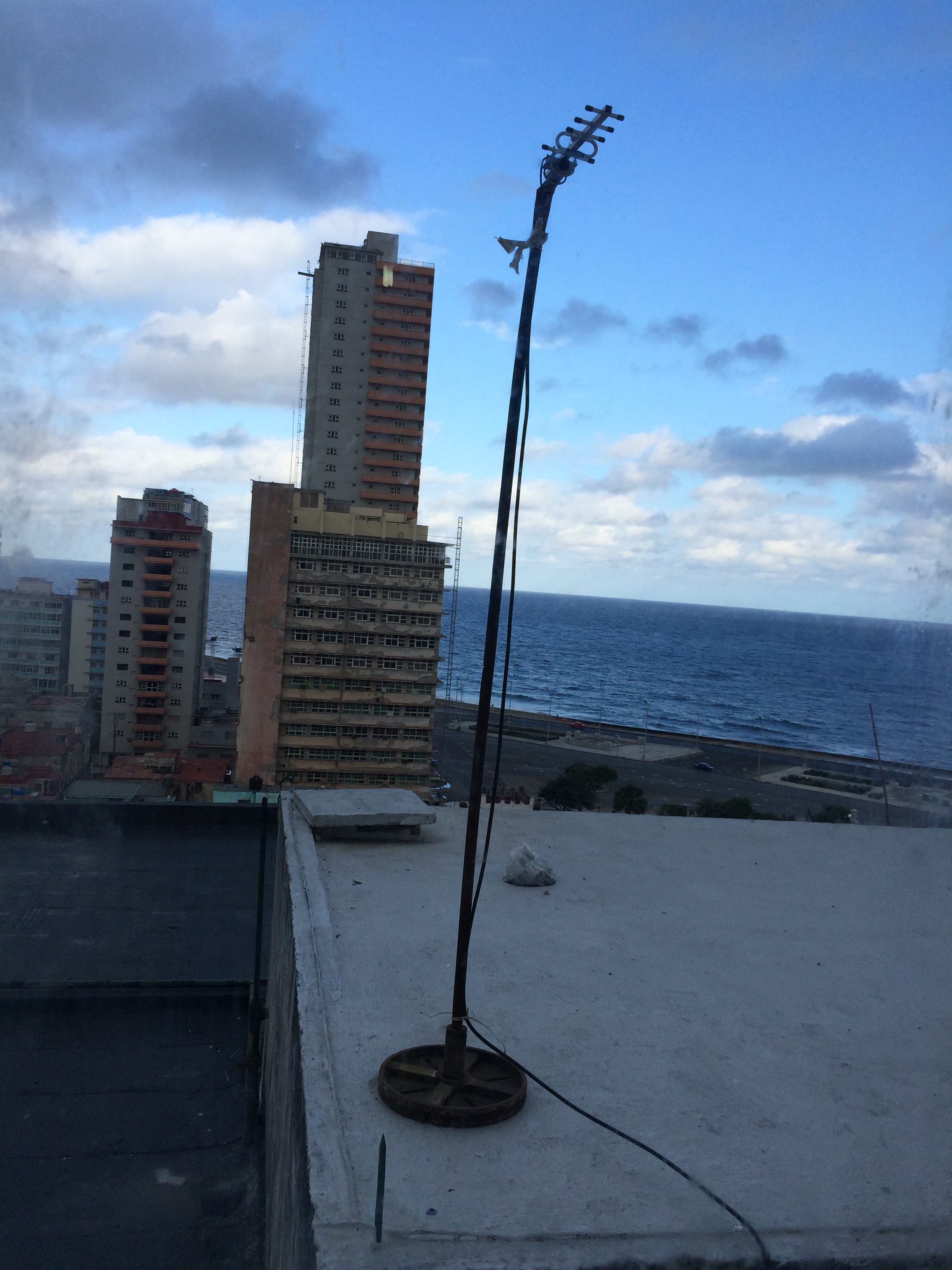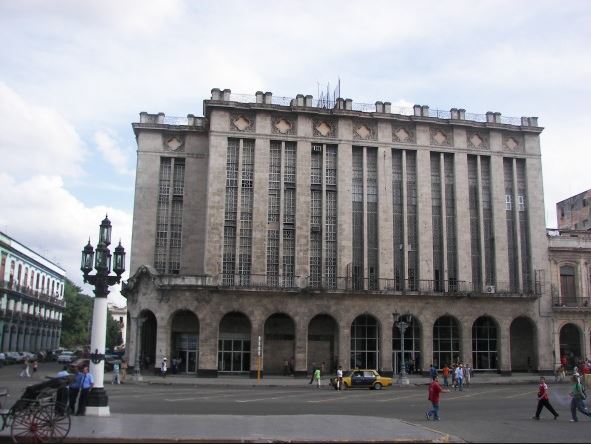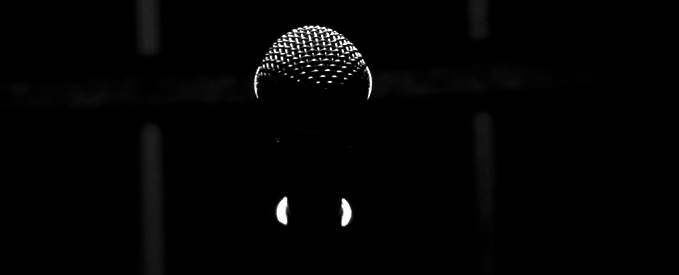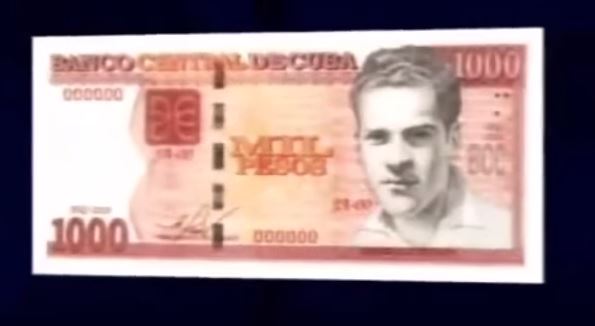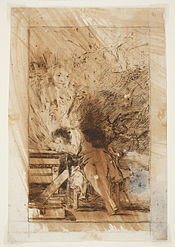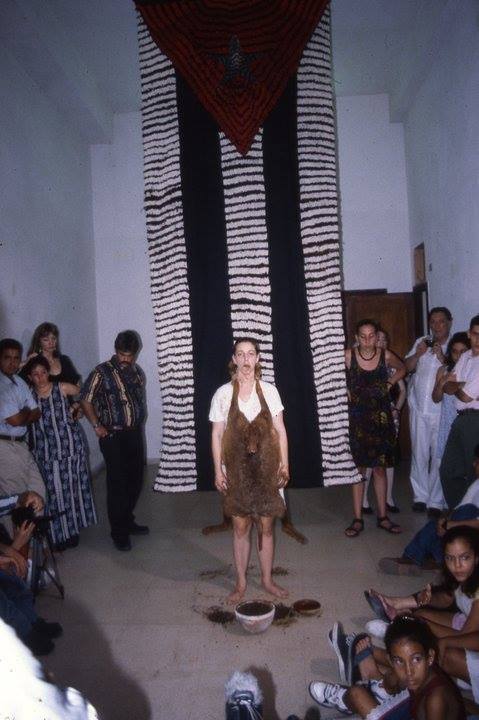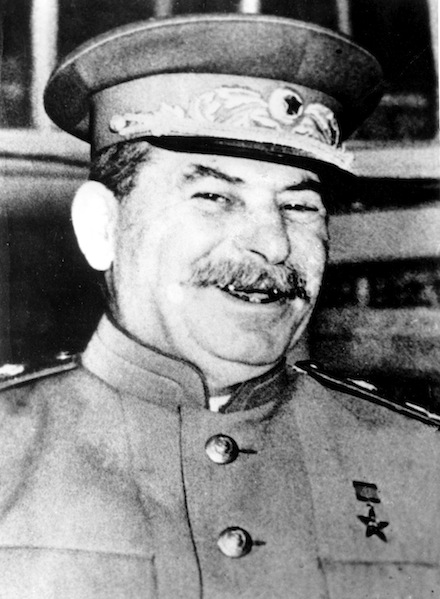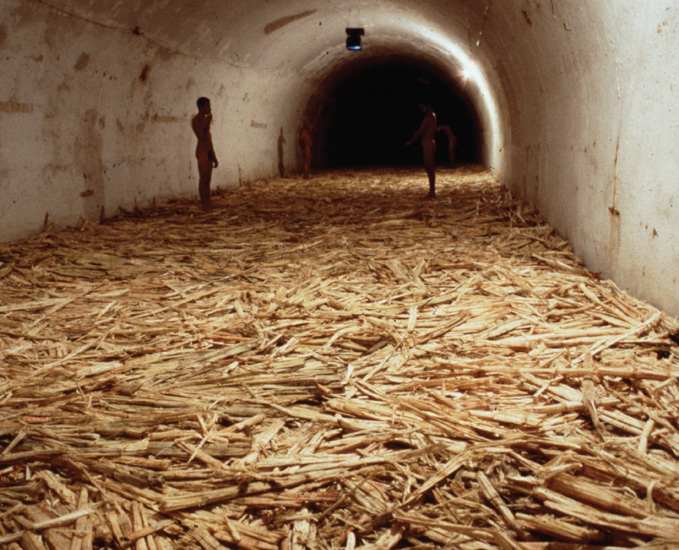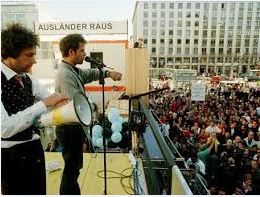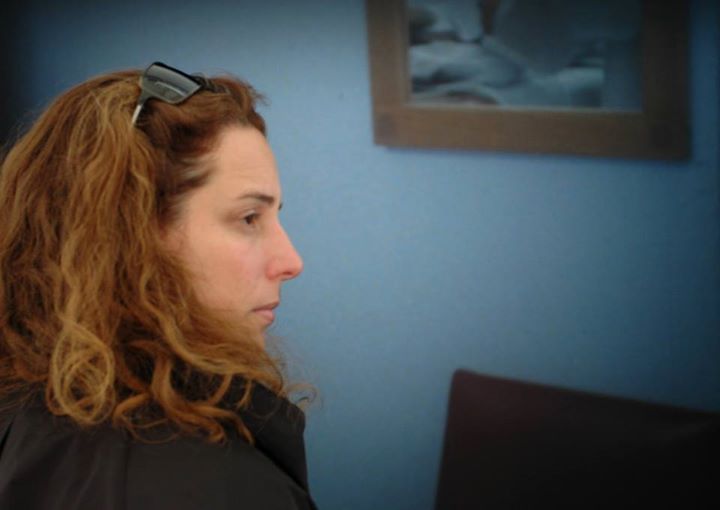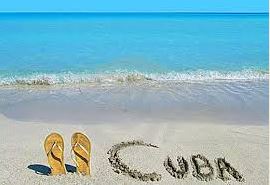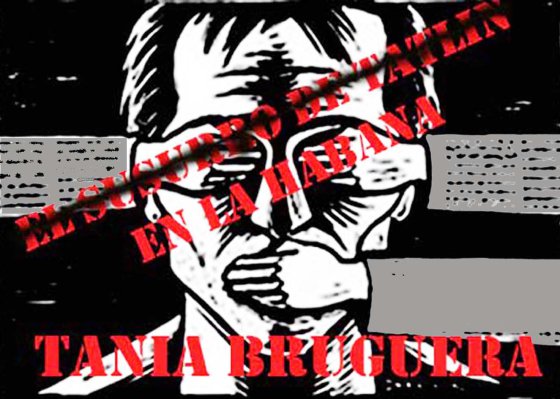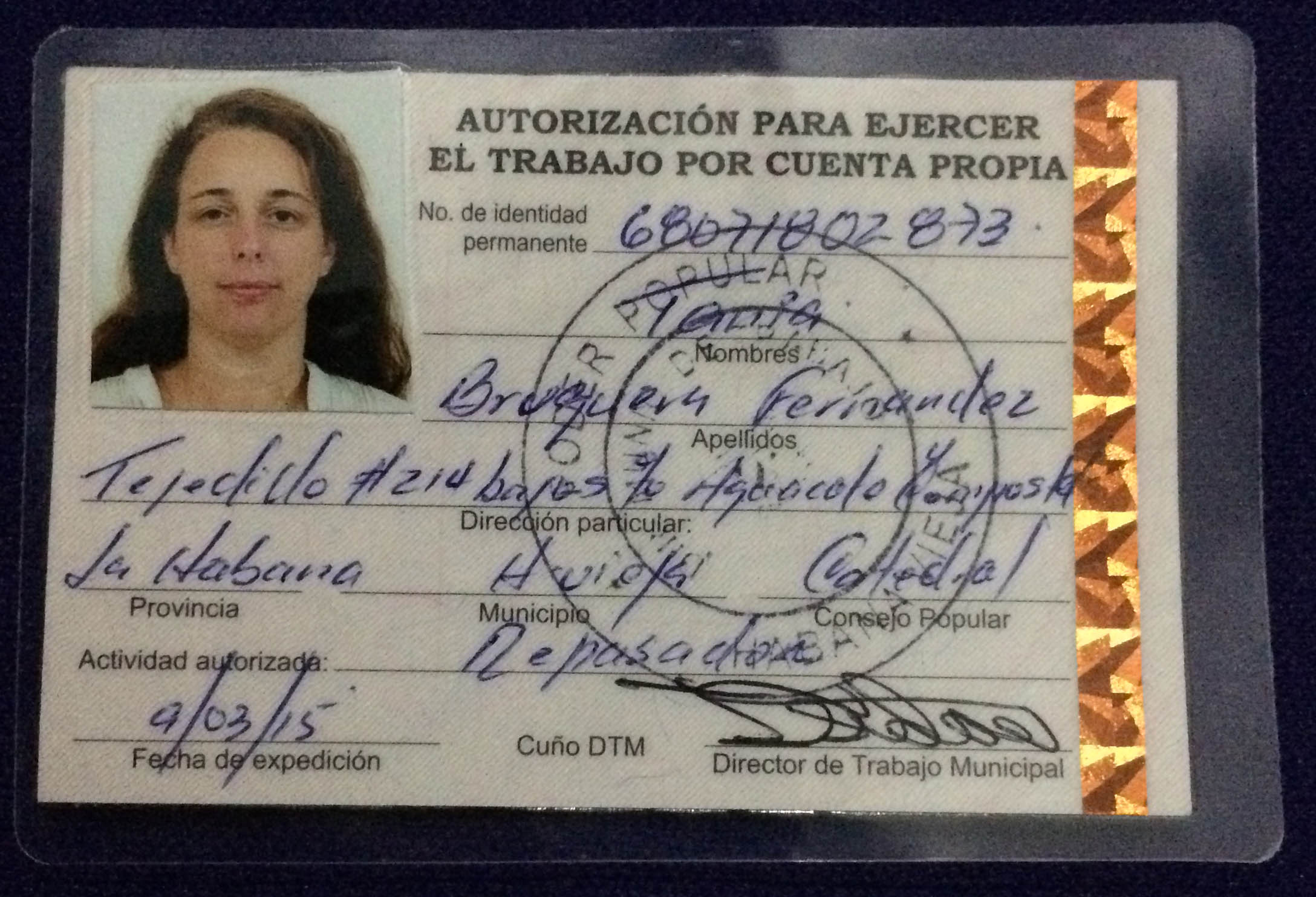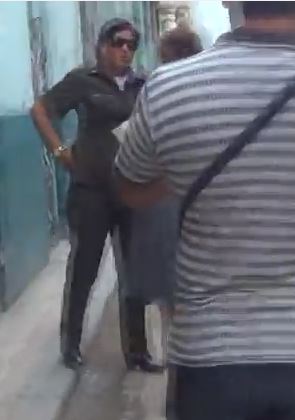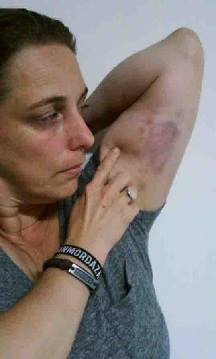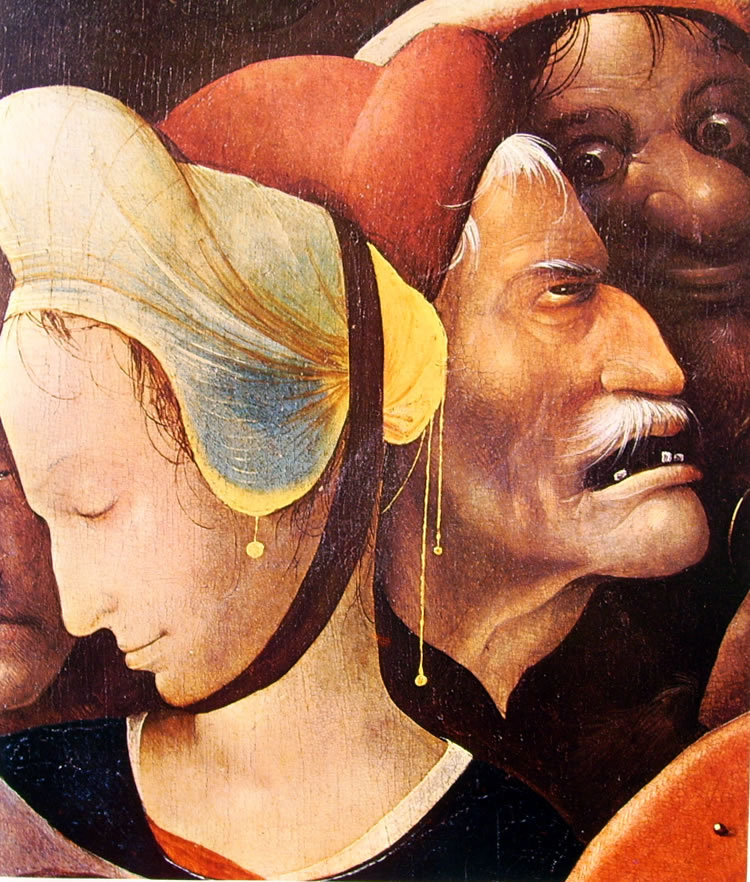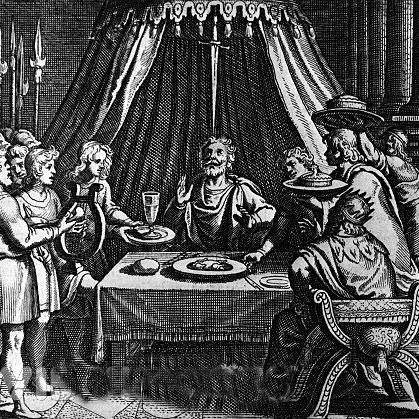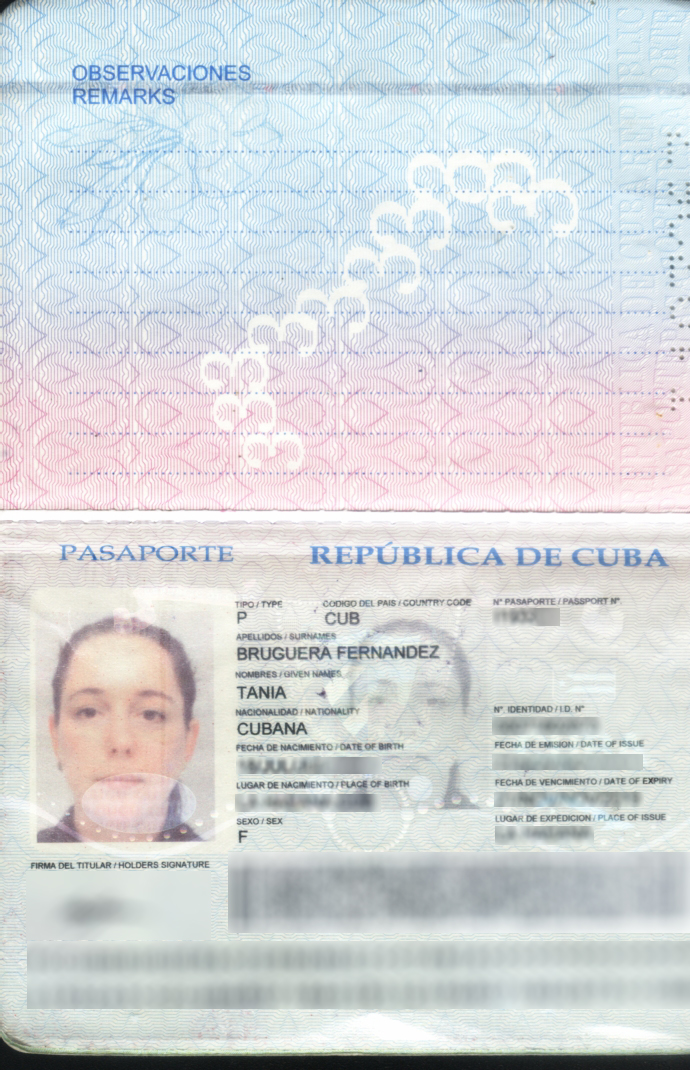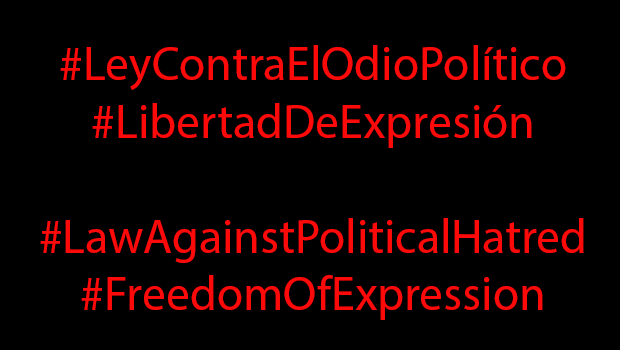- > Press Release #4
-
1.01.2015 .
Platform #YoTambienExijomore...01/01/2015. Bruguera may not leave Cuba in the next 2-3 months. They have pressed charges against her for resistance and disruption of public order.
The Cuban artist Tania Bruguera is already back to her house, at Havana’s neighborhood El Vedado. She has been released for a second time, after having a lengthy conversation with Seguridad del Estado, because she convened a meeting (also thwarted by security forces) after being discharged earlier today, with journalists and citizens at the Monument to the Victims of Maine, in Havana’s Malecón.
The next effort of #YoTambienExijo will be to achieve that these charges be dismissed, because the artist has not incurred in nothing that is not within her universally recognized rights as a citizen and artist.
#YoTambienExijo Will also focus on ensuring that those who are still deprived of their freedom in Cuba are released immediately, and around 9 am, on 01/01/2015, Tania Bruguera will be informed of developments on this matter. If they had not been released before that time, she will take steps to achieve their liberation.
“Now I will take a rest, I will sleep today. Today I am a proud sister. Today I am more the sister of all Cubans. Today I met the true solidarity.” Said Deborah Bruguera and continues:
“To you all and everyone, today I am a happy person because we are all more united, our rights begin to be listened and to take voice. An hour and a half ago a new year has started, a year that brings more hope and rights for all. #Exíjelos!
#DescansoFinalmente #MañanaEnPieConTodo #FuerzaCubanos #YoTambienExijo Hope”
Official information:
. SITE #YoTambienExijo: http://www.facebook.com/YoTambienExijo
. EVENT on Facebook: https://www.facebook.com/events/1515487705372907/
. CONTACT exige@yotambienexijo.org
- > Letter to the Deputy Ministry of Culture
-
5.01.2014 .
Havana, Cubamore...Camrade Fernando Rojas
Deputy Ministry of Culture
Republic of Cuba
Upon my return from Documenta11, the Ministry of Culture awarded me, on November 27, 2002, and along with other young artists, the Distinction for National Culture. For years I did not give importance to this event because it did not change anything in my life or in my thinking. In fact I did not remember whether I’d kept it or whether I’d lost it. After the recent events, this distinction had a different meaning for me.
Today I return this Distinction to the Ministry of Culture, I’m putting it back in the hands of Deputy Minister with whom I have had already ideological discussions about censorship. Today I also renounce my membership in the National Union of Writers and Artists of Cuba (UNEAC). I cannot uphold a distinction or be part of an institution that proposes to speak for all of us, but where only one; the chairmanship of the Organization signs on our behalf,. Cultural Institutions that instead of opening up dialogue and a space for aesthetic analysis, criminalize, judge, reduce the response to an artwork by generating fear of the work while disengaging themselves from it.
I have heard many times in Cuba “this is not the appropriate time to voice a critique” or to use a metaphor or to make a play. Many times I autocensored myself, upon hearing those words that magically seem to find blame in doubt or question an opinion. Today I know that the right time for an artist is ALWAYS, but especially when the ways to assess the social and the human are put under suspension. The right time cannot be a government directive because that would be propaganda, not art. The artist would be at the service of a government and not the society at large. Opinions and art cannot exist only when it is permitted by the institutions. I think it was the right time to do an artwork, because all the decisions about what Cuba is going to be, have still to be made, they are not implemented yet. There is still hope and many people believe that there are undefined spaces of which all Cubans could be a part.
Changes in Cuba cannot be real if the decision comes from the top, it is informed and has to be accepted as such. Changes in Cuba cannot be real if a different opinion is only given when the government invites it. Changes in Cuba cannot be real if Cubans are afraid to use certain words such as Human Rights. The changes in Cuba cannot be real if a Cuban is afraid that his opinion will leave him/her unemployed. Changes in Cuba can not be real if what interests the government about Cubans is their capital and not their ideas.
How sad is a government that sees one minute to speak up freely given to the average Cuban folk without its control as a State threat! How sad a government that imprisons the audience assisting an art performance.
Today I do not renounce my past, but rather place my bet on our future, because Cuba can not open itself to the world, without opening to Cubans themselves.
Yours sincerely,
Tania Bruguera.
Havana, January 5th, 2015
- > Communique #3
-
9.01.2014 .
La Habana, Cubamore...These days I have had to answer the same questions again and again. At the beginning this was for mean exercise against amnesia, because in Cuba we have learned pretty well how to forget, out of interest or pain. Today, those questions that focus on the particular events I am going through do not seem to me to be pertinent because curiosity cannot substitute the message that the Platform #YoTambienExijo has raised. What has happened to me is not an isolated or unique case, is the modus operandi of a government with fear.
Many people have asked me if I consider it a failure not having been able to speak at the Revolution Square and make the performance as I conceived it. But the fact that the director of PS1 MoMA (who is a specialist in performance) was there waiting and was so afraid that he changed his plane ticket to leave that same day instead of staying for the holidays as he had planned; the fact that what happened was so extreme that today I know for sure who is who, because all the masks are gone and all the ambiguous attitudes of some intellectuals to please both the officials and the foreigners that come looking for an exotic dissent have had to be defined; the fact that at the Square the State Security agents dressed as civilians could not beat anyone because the activists that were there showed a discipline that said more than a thousand words; the fact that the amount of people that was there was there, because the idea was not to have a Square full of people but just to be there, the idea was to not be afraid; all the above made it a better performance. As an artist, I am satisfied because the work pointed out what they have been trying to hide, that the government is not prepared for what it cannot control.
Today, when el Sexto is still in prison for wanting to make an art work; when Boris González Arenas was expelled from his work place because of his writings which are seen like “lack of reliability”; when Hamlet Labastida has his Cuban passport, the only one he has, invalidated since a few months ago for having made a respectful but questioning comment on a blog; when so many people write to me to tell me the things that have happened to them and their families, I would like to encourage you to make a documented and demonstrable list of the consequences some of youhave suffered for having ever wanted to say or do something that showed your thoughts and were “punished” because it was not what the government wanted to hear. The idea is that never again any Cuban be afraid to think.
Many people have asked me, especially the State Security agents, who is this platform? Today I am finally going to answer that question: Fuenteovejuna, sir.
Tania Bruguera
Spokesperson Platform
#YoTambienExijo
Havana, January 9, 2015
- > He used his minute
-
15.01.2015 . Havana, Cuba Download PDF Havana surprises, not because of what it shows, but rather what it suggests. Yesterday I went with my mother so she wouldn’t have to run her errands alone because she’s getting on in years. Imagine my surprise when we arrived at one of those public service places (I’m going … Read more
more...15.01.2015 .
Havana, CubaHavana surprises, not because of what it shows, but rather what it suggests. Yesterday I went with my mother so she wouldn’t have to run her errands alone because she’s getting on in years. Imagine my surprise when we arrived at one of those public service places (I’m going to respect its anonymity) and the young man who attended us relayed his admiration in a low voice and looked me right in the eye, intensely and complicit.
I didn’t respond because I thought he’d mistaken me for someone else. Then he said: “I watch the channels.” And he winked. And he went on: “You’re very brave and you’re totally right. You were right to do what you did. I would have gone (to the Plaza of the Revolution) and said, ‘How is it that the children of the leadership leave the country and in three months have their own business in a foreign country?’ That can only happen with the people’s money.” I told him I couldn’t talk, that I was only free on probation. “I know,” he responded.
The only thing I said, perhaps so he’d hearit straight from me and know who I am, is that they’ve geared up a tremendous defamation campaign against me, accusing me of being connected to the American secret services and to drug trafficking, which is far from the truth. “Don’tworry,” he said. “Everyone here already knows their defamation techniques and nobody believes them.”
My mother and I concluded our business and said goodbye as if nothing had happened. But I left feeling much stronger because at least that fellow Cuban had given me an uncensored minute.
I left feeling much stronger because the man I didn’t know who called me by name and extended his hand to me, which I reciprocated (more out of courtesy), and the young woman in the back seat of the ten peso Cuban-only taxi who stared at me intensely no longer make me thinkthey’re security agents following me… They now make me think of something muchmore human: of the people, my fellow citizens, and that they must be the very reasons my parole officer insists every day, and with greathigh-handedness, that I should not leave the house.
Tania Bruguera
January 15, 2015
- > Yours is the 25th case of 2015
-
16.01.2015 .
Havana, Cubamore...Yours is the 25th case of 2015
I was finally able to speak with the person who serves as my parole supervisor. She explained that, from this moment, the prosecutor has seven days to bajar la medida, or to bring charges, the technical term for what happens during this phase. She makes it clear as well that I can’t get an attorney until the charges are filed but that the attorney I’ve talked to already (whom they still can’t identify, which prompts them to ask me questions in a variety of ways to see if I’ll spill his name) may go see the file on his own (although he can’t file a response yet and, technically, can’t even begin to work on the case).
I’m surprised by all this because, up to now, she and a specialist from State Security had explained that the prosecutor had ten working days (which ended yesterday) to bring charges and that, once I had my case number, I could contract a lawyer. I’m concerned that the prosecutor is just now receiving my case because every time I was arrested I was told it was the prosecutor who would decide whether I had o stay or could go free.
But what does any of that matter, or if it was true or pure manipulation, when I read the news that some of the prisoners released as part of the negotiations with the United States were physically attacked and some even detained again for wanting to meet (isn’t that what Fidel, Raúl and their friends did when they were released from prison?).
What difference does it make to have my file number when it seems the Cuban government is only interested in negotiating money matters and not human rights, nor in the transparency of the political and economic processes that will define the lives of many Cubans who have not been given the opportunity to be heard, if in fact we’ll continue with a system which merely informs about its decisions and leaves no option of response other than to accept unquestioningly.
What difference does it make that they’ve moved the dates for the decision about my case until after the U.S. government delegation has left, since the only thing that matters about the U.S. are its products and not its history of struggling for civil rights. What does any of this matter when all they want is for us to be consumers and not citizens.
Tania Bruguera
Havana
January 16, 2015
- > Performance Damas
-
19.01.2015 .
Havana, Cubamore...I remember as an important moment in my artistic thought process the Site Santa Fe Biennial from 1999, curated by Rosa Martinez, in which she included images from Greenpeace actions as part of the exhibit. They were large photos in which the beauty did not lie in its depth of field, nor in its composition, but rather in the disproportion that existed between a determined group of people and the powers that they were facing, generating visual images that spoke for themselves. One day, many years later, walking through the streets of Havana, I saw a group of women, silent, all dressed in white in the Malecon. They were no more than twelve. But the strength of that image remained impregnated in me. I said to myself: This is the best performance that has been done in Havana.
Yesterday I counted 78 women, dressed in white, that walked in silence, in one of the longest performances in the history of performance; a performance made by activists only upended by those Madres de Mayo. Maybe in Cuba some will differ with my artistic appreciation, but to talk about the subject we would have to refer to “artivism”, which already has a long history, and not only for the concept of art that is deriving, rather small, in the socially committed art in today’s world.
It may be that las Damas de Blanco and #YoTambienExijo may not coincide in everything, nor may we have the same opinion about certain things (I recognize that we have not had the same experiences). The Damas de Blanco see themselves as an action of political protest and #YoTambienExijo is a political work of art. But, there is a point in which we both coincide: that we need ALL cubans to have the right to be active free political citizens.
I want to thank all those Damas that yesterday inundated me with their love and gave me part of their strength, which is persistence.
Tania Bruguera
January 19th, 2015
- > Open Letter to To the members of the civil cuban society, to the opposition that has met with the American politicians that visited Cuba and to those that will meet with Undersecretary Roberta Jacobson
-
20.01.2015 .
Havana, Cubamore...To the members of the civil cuban society
To the opposition that has met with the American politicians that visited Cuba
To those that will meet with Undersecretary Roberta Jacobson,First, I wish to congratulate you for having the opportunity to be part of a historic process, for bringing a different vision to the reality in Cuba, and for giving a voice to people and groups that also have a right to exist and to be respected.
Now, in the life of a Nation there are few moments that offer the opportunity to move the building blocks of a society so they may open spaces to redefine ideas and practices that define that Nation. In these circumstances, a tactical error may produce twenty to thirty years of policies which will be difficult to change.
#YoTambienExijo celebrates that the Cuban opposition is not a uniform group and that everyone may have their own positions. But, we have to acknowledge the historic possibility that they have been handed at this point.
Now is the time and the moment for everyone together to demand that they be given a seat at the same table with the Cuban government to discuss directly with them, face to face, our demands as Cuban citizens. A Dialogue Table among Cubans would demonstrate the strength of the civil society; would allow to truthfully represent the persons affiliated with such organizations; acquire real political power and eliminate the criminalization of critical opinion. It would demonstrate that civil society has reached its maturity and does not need to be spoken for.
#YoTambienExijo thanks all those that have offered themselves to listen to another version of the reality in Cuba -that has been important- but we do not accept that no one speaks or decides for the cuban people.
The humanist Republic that we merit needs participation, conscensus and real power of decision for cubans.
Un abrazo,
Tania Bruguera
Spokesperson, #YoTambienExijo
La Habana, January 20, 2015
- > From ideology detector to opportunity detector
-
23.01.2015 . Havana, Cuba Download PDF I had always heard the stories about Virgilio Piñera, Heberto Padilla, Reinaldo Arenas. Stories on how difficult reconciliation and forgiveness are. I had heard how much more courageous it is to say “I am afraid”, than to defend something you don’t believe in. How, when you say “I am afraid” facing that … Read more
more...23.01.2015 .
Havana, CubaI had always heard the stories about Virgilio Piñera, Heberto Padilla, Reinaldo Arenas. Stories on how difficult reconciliation and forgiveness are. I had heard how much more courageous it is to say “I am afraid”, than to defend something you don’t believe in. How, when you say “I am afraid” facing that person who generates such fear, when you conquer it, when you stand in front of him as easy prey, vulnerable and disarmed, you are victorious. I also knew that, when you learn the art of being a ventriloquist disengaging yourself from what you feel, what you think and what you say, then the victory is theirs, because a good ventriloquist no longer identifies from where he speaks.
There is a great difference between being opportune and being opportunistic. To me the options are very clear.
But today the ventriloquist experiences a mutation which makes him bilingual: while he speaks with discipline with the police inside his country, allowing himself to be used to harm others, he speaks also proposing the opposite discourse. He even pens letters for the public that contradict him. This, so he may remain intact with those outside the country that may make invitations which may pad his curriculum, lying to everyone on the way, while leaving a trail of venom.
Tania Bruguera
January 23, 2015
- > El Sexto
-
25.01.2015 .
Havana, Cubamore...My 94 year-old great-aunt asks me, “So what finally happened to the young man with the slippery pigs? Have they released him yet?” The answer is the same: No. My great-aunt smiles when she thinks about El Sexto’s performance because performances also exist as mental images; indeed, that’s the best kind of documentation.
The jailing of El Sexto recalls the jailing of Ángel Delgado’s for defecating on an issue ofGranma during an exhibition back in the 80s; even then, it was already used as sanitary paper in many homes, less as a matter of social critique than a solution to a practical problem.
The relationship between these two events makes me rethink how quickly aesthetic criteria can be used to justify an act of non-solidarity by colleagues in the trade. Time and time again, decade after decade, we hear the same hackneyed arguments… it wasn’t a good piece, the idea was too obvious, he did it to call attention to himself, it wasn’t the right moment, everybody is already familiar with the limits, etc. At times like these, the critics become the police and the police become critics. Aesthetic criticism becomes a weapon of the Revolution. Aesthetic criticism becomes the perfect excuse to refuse to be implicated; the perfect excuse to hide behind a profession that allows us to think we’re better than others, especially whom ever’s in trouble. I don’t think a set of aesthetic criteria exempts those who do nothing when confronted with injustice from responsibility. I can’taccept that an aesthetic criteria is worth more than a person’s life.
I don’t know El Sexto personally but these days I can’t get a video he made of a conversation in Kcho’s studio out of my mind… I don’tknow if I should call Kcho, who knows him personally, and who is not only an artist, but a member of the National Assembly. Perhaps, given his position, he might be able to understand not only the differences in aesthetic criteria but also the political implications of censoring art.
Tania Bruguera
January 25, 2015
- > To Kenia
-
27.01.2015 .
Havana, Cubamore...Kenia Maria, I feel very sorry that even when you say that I could be a good collaborator for the Cuban State Security, in spite of your commendations on my qualities for that (I think that above all you said that I waspassionated and principled) I will never become one. Fortunately, I do not do things for ego’s sake, but because of my convictions; and working for a repressive entity (it does not matter for what country) goes against my principles. A police force that has forced us in -mostly to keep an eye on ourselves- first at school, then with the CDR (Committee for the Defense of the Revolution), at work, and in that paranoid space that is Cuban daily life. Maybe so you wouldn’t have tried it, I should have explained to you that the image I have of State Security is not that of En silencio ha tenido que ser, but rather that of my father taking me for “a walk” to a house in Nuevo Vedado, close to the Acapulco movie house, so that some colonels from State Security would interrogate me about the newspaper Postwar Memory (Memoria de la Posguerra). If at that moment, having used my complicated affectionate relationship with my father-under the most severe psychological pressure that I have ever been in my life-they did not succeed in having me “talk” nor in “converting” me, how do you think that they would succeed now? When before dying in 2006, my father made peace with me, having realized that I was right in many of my criticisms. He said he was proud of me because when I believed in something I would defend it against everything and to its ultimate consequences, even if that included himself.
Kenia, it is not you, it is I, and like me there are many, and every day more.
Tania Bruguera
January 27, 2015
- > Energy thief
-
28.01.2015 .
Havana, Cubamore...The only way to wait is to grab on tight to the facts of the matter.
I can not allow myself to retain the image of my phone, connected to thecomputer, opening up files without my having touched it. I must have imaginedit.
I can not give an explanation to emails I’ve received with various sectionsunreadable because they are computer language because I understand nothingof computers.
That the machine suddenly says that it does not recognize a new applicationwithout having connected anything to it must have been because somethingwas broken when State Security returned it to my mother. Or since it is not myown computer I may not understand it well.
Maybe its better to believe the “instructor” when I asked her about the car thatwas following us a few nights ago (verified) and she answers me that maybe itwas someone jealous spying on a lover and got confused with our car. Maybe Ishould look for a different explanation to her answer, when, two days later, Iasked her about a car that was following me to an exhibit and she said that thecar that I described to her did not match the model that they use (Geely). Mustbe I don’t know much about cars.
Probably the gentleman that drew near to us in the street to tell us that someonewas taking a video of us from the opposite sidewalk, must have been a madstreet-person.
I tried to explain to my mother that we mustn’t exaggerate when she saw atechnician redirecting the camera in our corner post so that it could capture ourstreet and the entrance to our building, and that it wasn’t because of us,because the camera will capture much more important things; that it had nothingto do with us , that we mustn’t exaggerate.
Neither should I think that the antenna that they directed to our house and to thestairs in our house from the building next door, was placed by State Security. Itdoesn’t matter that it was placed only two weeks ago.
I shouldn’t try to solve the problem of my cell phone having such badconnections recently. Nor that every time that I make plans for a foreigntelevision interview the “instructor” calls me in for another type of interview,because coincidences do exist.
I can not think that the video images of me getting out in my house with StateSecurity agents and policemen, or entering and exiting the police station, ordressed first as a civilian and then as a jail bird, will be used in a MesaRedonda (“round table”). They will not give me that stardom, unless they arevery desperate.
I can not find a connection with the sudden importation to Cuba of Ernesto LuisLaffita, one of the people most enthusiastic with our #YoTambienExijocampaign, and that gave us moral support, urging us on and promoting us(although it was my “instructor” who asked him what people we had in commonand how he knew me) but I can be happy that he is finally reunited with hisfamily.
I can not think that any of this has anything to do with me, because the only wayto wait is to grab on tight to the facts of the matter, without looking for anexplanation.Because I know that this new antenna was placed there not to listen but to robme of my energy.
Tania Bruguera
January 28, 2015
- > A Lawyers Eyes
-
2.02.2015 .
Havana, Cubamore...I’m going through different law firms looking for a lawyer’s eyes that don’t drop, that don’t turn away, when I explain my case. The eyes of a lawyer who doesn’t lean back, or veer his sight, when I inquire about the legal process.
I’m looking for the eyes, and the good sense, of a lawyer who won’t wander the halls with the hope that I’ll leave, a lawyer who understands my patience has been building up for decades. The eyes of a lawyer, unlike the one who tells, Sign, just sign and get it over with.The eyes of a lawyer who, though he knows it’s a lost cause, will look right atme, ready to defend, not me personally, but the right to freedom of expression.
The yes, the honesty, that I’m looking for belong to a lawyer of he future, so that I might be defended in the present.
I’m looking for the eyes of a lawyer who’ll look me right in the eye, unafraid.
In the meantime, with the hope reflected in the popular maxim that declares nobody’s perfect, I’m using my own eyes. I’m reading the penal code, the constitution and the legal decrees, looking for a legal loophole that might give me an opening. I’m going to empower myself.
- > Square Meters of Loneliness
-
3.02.2015 .
Havana, Cubamore...During this period, I’ve decided not to call anyone for fear of “infecting” them, as if I have a contagious disease that could ruin the life of anyone I see or talk to. In my head, I’ve been in a constant trial in which I’m presenting evidence, not of my own innocence but that of others. I’d accused myself of getting others in trouble. My phone rang – calls from longtime friends and new friends – but, with wariness (I’d lost my smile), I treated everyone with an uncharacteristic distance.
Then I realized I was doing the work of those who want to destroy me, the work of isolating myself, of feeling alone, of keeping my ideas spinning in my head instead of sharing them. I had made it so reality no longer existed.
But one day, my new friends and I decided to go out for lunch together and I realized that was precisely what they feared, that we’d go out to public places and speak freely and that the nearby tables would hear us, happy and free.
A few days later, an artist friend invited me to sit with him and talk bout his most recent work, art stuff, quite technical and specific, and as we were talking I realized that the only people to whom I’m doing a favor if I don’t share my knowledge are those who want to destroy me.
Yesterday, a student came to see me about his thesis and I was reminded how much I enjoy being a teacher.
If you’re a multidimensional person, it would be much more useful to those who want to destroy you if you shrivel away emotionally and professionally, if you reduce yourself to a less complex state of being. It’s not really that hard to stop being yourself, as I’d always imagined.
Today I walk the streets and separate people into two categories: those who have decided not to create new memories, repeating over and over memories of a better yesterday, and those who chose to live intensely, looking for ways to create memories for a better tomorrow.
Tania Bruguera
February 3, 2015
- > Press Release #5
-
4.02.2015 .
Havana, Cubamore...February 4, 2015. After one month of having her only passport confiscated by the Cuban Ministry of the Interior and with no possibilities to exit from Cuba, artist Tania Bruguera – currently under conditional freedom- must wait for another period up to 60 days, so that the Prosecutor may weigh in on the charges brought by the Cuban government: inciting public disorder, resisting police and inciting to commit a crime; or that he may present new charges.
While a prosecutor in Cuba may take up to 180 days to prepare a case or make a decision, the defense attorney has only 5 days with no possibility of extend it, in order to refute the prosecutor’s decision. Besides that, defense attorney has no access to the file during the preparatory phase until the Prosecutor makes a decision (as it has been explained to her by 3 Cuban lawyers).
After visiting several law firms in Cuba, Bruguera has exclaimed: “It is very difficult to find a defense lawyer that would want to take my case since it is a State case against me. Lawyers have told me it is a lost cause; others have told me that they are afraid of the professional consequences if they defend me”.
“In Cuba, three branches of state (executive, legislative and judicial) are all one in fact. That makes citizens like me extremely vulnerable and turn them into victims of abuse of the Government’s powers”, the artist exclaims.
Bruguera wanted to carry out the performance “Tatlin’s Whisper#6” in Revolution Square in the city of Havana last December 30th at 3 pm (local time). The work pleaded for the civil right to express freely and peacefully for sixty seconds, respecting political and ideological diversity in Cuban society and making feel citizens as the owners of their own destiny as a nation.
Support from the Art community
The well-known website The Voice Project, has written a letter to Raul Castro Ruz, President of the State Council and of the Council of Cuban Ministers, and to Maria Esther Reus González, Minister of Justice, demanding to decriminalize freedom of expression jn Cuba and to remove all charges against artist Tania Bruguera.
“Freedom of expression is not a crime and should not be treated as such”, proclaims their demand (available at http://voiceproject.org/takeaction/drop-case-against-tania-bruguera/) and has been signed, among others by the Marina Abramovic Institute, Pussy Riot, and Directors of Museums and Contemporary Art Centers, curators, and human rights and art groups.
Tania Bruguera was arrested three times after she announced her performance, which provoked that more than 2000 art and culture personalities, friends and citizens of various countries -mostly from outside Cuba- signed a petition to Raul Castro Ruz demanding the artist’s immediate freedom, and respect for human rights, and generating a wave of international solidarity. On top of that, dozens of activists from the “civil society” (read non-governmental) also suffered “express detentions”.
That letter stated: “we see with profound worry that the work not only did not find an echo on the part of the authorities, but rather caused the arrest of the artist and a diversity of Cuban citizens. With all respect we ask for the freedom of Tania Bruguera and all those arrested. Bruguera is one of the best known Latin American artists, with a work that has been focused on social and political intervention, which is a result, as she has often declared, of her formation under the Cuban Revolution. We are convinced that her arrest and retention of her passport are inadequate reactions to an art work which only seeked for a public discussion space”, the letter reads.
Her conversations and movements are constantly monitored.
Order and rights
Previous to the performance, Bruguera asked the permissions for Cuban authorities and she obtained a negative answer to her formal application for protection and guarantee of order submitted to the General Office of the National Revolutionary Police (PNR).
Despite the lack of support from the state and Cuban government, several personalities of the artistic and cultural world in Cuba and abroad had confirmed their support in logistics and presence, thus validating its essentially artistic nature.
“The artist has the right to disagree with power, with the status quo, and has the right to be respected for dissenting and to be protected for dissenting” says Bruguera in the Manifesto of the Rights of the Artist, read publicly in the “Expert Meeting on Artistic Freedom and Cultural Rights at United Nations Headquarters, Geneva, on December 6, 2012.
The chosen Plaza is a large-enough public place for different points of views being expressed. “The governments of nations where artists work have an obligation to protect the right of the artist to dissent because that is its social function.” Bruguera holds in the Manifesto.
“From the beginning, we have worked with discipline, order, respect for the law, seeking information about public activities regulations, we have requested the permissions and we received support and social acceptance for a peaceful work,” says Bruguera. Given the refusal of the authorities, the artist had ratified the work would be done because it was a peaceful action and a contribution of art to necessary debate of ideas in Cuban society.
“We demand a humanist and sovereign Republic”
Before talks held in Havana between Cuba and the United States governments, Tania Bruguera, as spokeswoman #YoTambienExijo (“We Also Demand”) platform, publicly demanded the need for a humanist and sovereign Republic: “In a Nation life, there are just a few moments like these that offer the possibility of moving foundations of a society in order to open spaces allowing re-evaluate ideas and practices that define it. Humanistic Republic we deserve requires the participation, consensus and actual decision power of all Cubans. ” says the document published on January 20th.
“A Roundtable Dialogue among Cubans would demonstrate a healthy civil society, would truly represent the people affiliated to the dissident organizations, it would allow them to gain real political power and it would remove the criminalization of different opinions. It would show that civil society has reached maturity without needing for others to speak in its name. ” she added.
“It seems that the Cuban government is only interested in negotiating money matters without paying attention to human rights and to the transparency of ongoing political and economic processes which could define the lives of many Cubans who are not involved in; we are keeping living in in a political system that informs vertically their decisions and the only response to these decisions is to accept them with no questions, ” says the artist.
On January 5th, Tania Bruguera handed back the Distinction for National Culture conferred by the Ministry of Culture in 2002 and resigned his membership of the National Union of Writers and Artists of Cuba (UNEAC). He argued: “I cannot receive recognition, or be part of an institution that claims to speak for everyone but the chairmanship is the only who sign. That institution criminalizes, judges and reduces the response to a work generating fear instead of opening a dialogue and a creating a climate for aesthetic analysis.”
Political Art is uncomfortable
“Political art is performanced when is outdated. The art is political when it is uncomfortable, legally awkward, civically uncomfortable, and humanly uncomfortable. When it affects us, political art is uncomfortable knowledge”, says Bruguera in her Manifesto of the Artist Rights.
The Cuban National Council of Fine Arts (CNAP) decided not to support the project Tatlin’s Whisper created by the artist. “Under current circumstances, it is unacceptable this purported performance in the symbolic space of the Plaza of the Revolution, especially if considering the extensive media coverage and manipulation from counter-revolutionary media broadcasters “, read the official Cuban organization statement. “The institutions belonging to the Ministry of Culture will be not responsible for the implications this act could provoke”, warned the Council.
While official statements speak of “counter-revolution”, Tatlin’s Whisper mobilizes the imagination of other squares revolutionized since 2011: Tahrir in Cairo, Sol in Madrid, Syntagma in Athens, Liberty Square in New York and its multiple virtual joints through communication networks. While Cuban official statements were denying the artistic status of her performance due to “its political connotations” and demanding merely “pure artistic creation”, Tatlin’s Whisper answered with a re-appropriation of politics in art.
Statement of Principles
Given the great interest created by the exhibition of artistic work “Tatlin’s Whisper # 6” in a public space such as a square, the artist published ten instructions for its completion. Among them, it stands the microphone would be open to anyone who wants to use it, each person would have a minute to speak, all opinions would be tolerated and that the audience could not interrupt any intervention.
Explicitly, the statement said: “Profanities, calls for violence, discrimination, insults to the integrity of persons, illegal acts or violent actions against public order will be not accepted”
Cuba-USA relationships
“Reestablishing diplomatic relations between Cuba and the United States will be a positive event for Cuban families, for peaceful coexistence in a globalized world and, most of all, for the individual and collective freedom of each Cuban.”, Tania Bruguera interviewed to Huffington Post site in mid-January before the round of negotiations between the two governments took place in Havana.
“In the open letter I sent to President Obama, President Castro and Pope Francis on December 17, I congratulated them on this historic moment, which Cubans have spent half a century waiting for. Hate and embargos accomplish nothing; only through dialogue and acceptance of mutual differences can we all grow and thrive.”, she added.
“This letter also led to the creation of #YoTambienExijo (“I Also Demand”), a nonpartisan, volunteer public platform. Through the key phrase of this missive, “Yo Exijo” (“I Demand”), Cubans are asking for the fulfillment of their civil, political, economic and cultural rights. Why? Because it’s impossible to talk about the future of Cuba without taking Cubans’ rights and opinions into account. It’s not healthy for a society to think only of possible economic improvement. It’s not healthy for us to think that Cubans’ only future is to be consumers.”, Bruguera stated.
Official information:
SITE #YoTambienExijo: http://www.facebook.com/YoTambienExijo.
EVENT on Facebook: https://www.facebook.com/events/1515487705372907/
CONTACT exige@yotambienexijo.org
Additional Information:
MANIFESTO OF THE RIGHTS OF THE ARTIST (read at the UN):
https://arendtinstitute.org/wp-content/uploads/2012_-_onu_-_esp.pdf
- > Change in Cuba
-
5.02.2015 .
Havana, Cubamore...It’s easy these days to know what change is in Cuba: You write the word “change” in a text and send it to 8888. You then receive a message that details the exchange rates for convertible currency, the Euro, the U.S. and Canadian dollars, the Pound Sterling, and the national currency. That’s what change is about in Cuba today: money.
These days the new ideology on the streets is money; nobody cares if we’re a socialist or capitalist country. What matters is how much money you have. Cubans on the street aren’t and do not want to be “flag bearers for a better world”; they are instead survivors of the two-currency system, of salaries that can’t provide for basic necessities, and of merciless policies that price everything in convertible currency.
There’s a new social conformity in Cuba: those who serve and those who give orders. It’s all a game, and the game consists of trying to be like the rest of the world; that’s the new aspiration. The game favors “those who left,” those who’ve become wealthy by virtue of their proximity to power, those who’ve learned the ways and the rules of the black market, and those who managed to resist lowering their self-esteem during darker periods. As the popular saying goes, so much paddling just to die on the shore.
Tania Bruguera
Havana, February 5, 2015
- > Being Cuban
-
12.02.2015 .
Havana, Cubamore...A friend from ‘outside’ with whom I had never talked about politics, our conversations were always sporadic and on art, just call me to tell me that she spoke to a friend about what has happened to me. This friend of my friend, whom I do not know, in his eagerness to help has called the Ambassador of Cuba in his country to talk about my case. He received the following response (Quote) “Tania is not a resident of Cuba and you should not touch that subject.“
On two previous occasions, the Cuban government has solved the problem saying that I am not Cuban. These two occasions have been: the first one was after the performance in Bogotá in 2009, a newspaper called the Cuban Embassy to know the opinion of Cuban representatives on my work and the response was that I was not Cuban, therefore they did not have nothing to declare. The second time was after my presentation on the Commission for the cultural rights and freedom of artistic expression in the United Nations in Geneva in 2012, when the representative of Cuba approached the person who organised the event to demand for inviting me, because I was not Cuban (although the event was aimed to global issues), adding later that I was an exiled, conveying an ideological tendency that would invalidate my statements (although these do not mention Cuba) https://arendtinstitute.org/wp-content/uploads/manifesto_on_artists_rights_-_eng.pdf. He talked close to me, I never knew if the idea was that I would hear him or only threaten with his vote.
This is the third time that I am aware that the Cuban government has denied that I am Cuban. I have been very stubborn and I never wanted to get a passport from another country, even if that would make me live easier. I have the bad habit of thinking that things do not have to be done to make life easier, but to render meaning to life.
In this whirl of negative and pressures, I also include an email dated in 2013, from the Superior Art Institute (Instituto Superior de Arte) of Cuba to the National School of Fine Arts in Paris, to inform them that they would not allow the visit of French students if I was the teacher who took them to the trip, and they told (not asked) the French institution to send another teacher instead. Luckily that tone does not work with everyone.
Some days ago I found out that a friend from the art world mentioned that when boarding the plane coming to Cuba, she was advised by a person of the company of tourist packages in Miami that she could not contact me. I have not yet received her call, I don’t know if she will be gone already. Anyhow it is good to know that the strategy of isolation of the Cuban government includes foreigners who come to visit Cuba.
All this makes me wonder whether the Cuban government denies that I am Cuban as a way to prevent persons who are concerned about me, to contact diplomatic, political and cultural institutions to make them responsible for what is happening to me.
Solidarity now resides in saying things as they are for everyone to know and to take them into account when thinking about what it is to be Cuban.
Tania Bruguera
February 12, 2015
- > Goliath
-
18.02.2015 .
Havana, Cubamore...I am crying, finally, but not because I think that I have lost, not because I feel that the strategies of the Security of the State to make me feel alone are working, not because there is a huge gap between what I can offer – an idea that I think must be defended – and what the government of Cuba offers – business opportunities and the chance to progress in a professional career – to those who have to choose. That’s not why; I am crying when I see other people’s fear.
Tania Bruguera
Havana, February 18
- > Self-Sabotage
-
4.03.2015 .
Havana, Cubamore...Ailer, one of the friends that was arrested on the 30th of December commented to me that during one of her detentions two “segurosos” (undercover Intelligence agents) asked her about the artistic character of Self-Sabotage and showed great interest in knowing more about this work. She asked me if the bullet in my performance of the Russian roulette was real. Listening to her I think not about that workof art but in how the State Security agents are thinking of using that information that they are inquiring about. In this “game” that I’m involved in now, personal information is being used with political ends and political information is being transformed into part of your personal life, everything is useful at some moment or in some way.
Lately another friend is calling me “kamikaze”, meanwhile one of the cultural functionary (who was present in that first meeting on the 27th of December) told me that my art-action was a suicide act (I interpreted this symbolically in relation to my career as an artist after trying to enact Tatlin’s Whisper in the Plaza, rather than my own psychological state). I have created a type of instinct these last two months, so when a theme is too recurrent and very different people are bringing it up, it makes me think that it’s something that’s not only of interest to these people, but also to those that are in the shadows seeking information. Since there is so much interest in whether I was capable of putting a real bullet in a gun to play Russian roulette; Since so many people have recently spoken to me of death and suicide; Since all information that reaches the Security of State is distorted and since today I don’t doubt when I think of the real consequences that can happen in Cuba when you expose a direct critique to power and demand change, I want to make a public declaration:
I don’t have suicidal intentions. I have never played with death in any of my future scenarios in any stage of my life, I have always seen what has happened to me as a challenge and I have enjoyed the difficult moments because they have made me grow. I like to look back at the path I have taken to elaborate self-critique, which is different than being self-destructive.
Today I am playing with a Russian roulette daily, not with a gun or with bullets, but with the consequences of my work. Today I am not reading a text about art and politics related to the work Self-Sabotage, I am practicing. Today I am not at a conference saying that the political artist should assume all consequences that are postulated in their work, I am living it. Now, I also declare that I wouldn’t trade anything for being able to stand and look straight into the eyes of the power that attempts to make me kneel, that is my Russian roulette today.
Tania Bruguera
March 4, 2015
Havana, Cuba
- > Stalin’s Smile
-
5.03.2015 .
Havana, Cubamore...And so it is true that Stalin’s smile should offer more fear than his orders.
I preferred it when the instructor called me all the time, her questions gave me an index of where the investigation could go and what her next movement could be. When I saw a car ridiculously following me, at least I knew they were there. Then the abuse being committed was very clear. Now they are submerged in the profound waters of intrigue and in that which can’t be proven first-hand. Do they have all the material they need, so that with manipulated information, they can create a negative opinion about me? Have I already said the right words to be used in the script that they have prepared? Have I ascended into the CR (counter-revolutionary) category or into another that has a different strategy?
Everything is excessively Kafkian and I have refused to believe, it is still hard for me to believe certain things that have happened around me, or experiences involving me that my friends tell me about.
I receive information about certain artist friends and curators that have come to Cuba but can’t communicate with me via cell phone, meanwhile they don’t allow all calls from dissidents and artists to come through my phone (which I can hear perfectly) [they are] from Martí Radio and Miami Herald (all good material to be used against me, but also all part of the performance I am doing).
A friend passes by to visit, and leaves me his Mexican cell phone and a Cuban cell phone that he bought (all through his own inspiration). After this friend visited an artist affiliated with the official government platform, and told that him that he had visited me and then defended me in front of him, the Mexican telephone he gave me magically stopped having service. I find out that the Cuban cell phone account was not in his name because the Cuban that he got it from started calling him desperately, thousands of times, finally sending him a text asking him to please erase his name from the account.
I receive information relaying that a close friend of a person that is part of the [YoTambienExijo] platform, that is located outside of Cuba, is being intimidated by a Cuban guy, who meets up with him in a place that has nothing to do with Cuba or me. Without any relation whatsoever, he mentions my name as a threat and as a guilty sentence. Are they giving trips to security agents for this operation or activating contacts with agents who live abroad?
I hear that a curator friend who lives outside of Cuba talks to a curator that lives in Cuba about my performance and receives a rehearsed response, as if they had given training sessions should a situation like this come up on a trip or with some foreigner (after letting me know that sure enough, the President of the Visual Arts Council Ruben del Valle met with the workers from the Council and the Wilfredo Lam Center, to give them the official version of my case. According to many people present, at the moment that questions could be asked someone wanted to know if they had returned my passport and Ruben del Valle, without offering a response, ended the meeting. A meeting was also held at I.S.A, so I am told. Maybe this is part of the preparations for the Havana Biennial? Or is it to justify apriori my next incarceration to the union? Or is it simply that these are the bases they have created for a state of negative opinion [about my work] and to discredit [my work] amongst intellectuals and fellow practitioners before publicizing [these bases] en masse?
Its not possible that I receive the same information from so many different places, its hard for me to believe that my decision to pacifically listen to someone’s opinion for one minute implies the use of so many resources, that they are in so many places at the same time and working on so many people (it can’t be that they have so much fear or that they’re that vindictive)
I don’t know, the fact is that today the chaos tactic they’re using is that I have information, not first hand, but of something that someone said, its interesting because if you ask me nothing is happening, and to me [it seemed] that the State Security had left me alone and in the hands of a prosecutor. Outside there are currents that can’t be seen but that can be felt, there’s a collective whisper that’s being directed.
Thanks Boris for telling me about Stalin’s smile, it has allowed me to understand the silence of the Security of the State a little better.
- > Press Release #6
-
6.03.2015 .
Havana, Cubamore...Havana, March 6, 2015- Tania Bruguera has been invited to the main exhibition atthe 56th Venice Biennale, from May 9 to November 22,2015. She is the only Cuban artist resident in Cuba among the 136 artists and collectives from fifty-three countries in the list released this week by the organizers of the event.
Bruguera was invited to the Biennale one year ago. In this edition she will re-create her performance and video installation Untitled (Havana, 2000), which reflects on citizens’ intentional “blindness” to the reality of life under Fidel Castro’s regime. Through a multi-sensory experience, spectators will discover a reality full of contradictions.
This piece was previouslyexhibited at the Havana Biennial in 2000 but after the inauguration, it was censored by Cuban authorities and it could not be repeated during the days the Biennial lasted, under the argument that male nakedness in public spaces is banned.
The own artist has been a victim of the state’s repression against art and political role of the performance. She was detained three times by Cuban government at the beginning of the year, her Passport is confiscated and she cannot travel out of Cuba under charges brought by the Cuban government: inciting public disorder, resisting police and inciting to commit a crime, after trying to performance at the Plaza de la Revolución in Havana.
The Venice Biennale was founded in 1895 and it is now one of the most famous and prestigious cultural organizations in the world. La Biennale, who stands at the forefront of research and promotion of new contemporary art trends, organizes exhibitions and research in all its specific sectors: Arts, Architecture, Cinema, Dance, Music, and Theatre. Its history is documented at the Historical Archives of Contemporary Arts (Asac) that recently has been completely renovated.
ABOUT THE BIENNALE: http://www.labiennale.org/en/art/exhibition/artists/
- > “Visit to Valle Grande Prison.” Conversation between Tania Bruguera and El Sexto
-
7.03.2015 .
Havana, Cubamore...I asked El Sexto’s sister to let him know that I wanted to visit him. A few weeks later I received a call: “Tania, its Danilo Maldonado, El Sexto, I put you on a list for the 21st at 12pm.”
I didn’t go to see El Sexto so we could interchange aesthetic arguments but rather because I don’t agree that an artist should be imprisoned for a work they weren’t able to realize.
I went because I think El Sexto has the right to wait for directions from his attorney and to litigate his case from outside of prison because (to use some of his own words) he hasn’t killed anyone.
I went because I think political figures, as public figures, are subject to commentary, critiques, and base jokes from those who are subject to their power (in the case of Cuba you’d have to put half the country in jail if making jokes about its biggest leaders is contempt -Desacato-)
I went because I think that an aesthetic argument can’t have more value than a gesture against something one finds unfair.
I went because I think that everything that is done from within culture and art should have dialogue and public discussion as a response.
Two days ago I talked to one of Kcho’s assistants to ask for an interview. I expect to speak to him about El Sexto since he is the one who represents visual artists at the National Assembly of People’s Power.
. LONG VERSION:https://soundcloud.com/yotambienexijo/bruguera-elsexto-larga
. SHORT VERSION: https://soundcloud.com/yotambienexijo/bruguera-elsexto-breveTechnical Clarification: The recording and latter publicity of this material was authorized by El Sexto. There were two edited versions, one five minutes long centered on his work and another ten minutes and twenty nine seconds long that adds a few experiences about the prison in which he is found. The editing was realized with the sole objective of organizing information and making audible the original material, which wasn’t available in good quality.
Special thanks to Lia Villares and Gorky Áquila.
- > To Claudia Cadelo and Christoph Schlingensief
-
7.03.2015 .
Havana, Cubamore...“That one day freedom of expression in Cuba will not be a performance” is something Claudia Cadelo said in 2009 when she stood for a second time before the microphone to activate the piece Tatlin’s Whisper # 6 (Havana version). With the accuracy that honesty gives, not only did it summarized in one sentence the collective desire that through art was being channeled, but it stripped the work. It showed the limits of what was happening there (the cathartic satisfaction that we could have had); it examined the dissatisfaction that freedom can have when its an illusion and it put a challenge to art as a civic space.
That one phrase stuck around with me for a long time, for five years. Every time it was this piece’s turn in presentations of my work, of the 40 minutes that it took for its documentation, I would always choose the moment at 4:29 min perhaps not to forget with that phrase the challenge that I had as an artist.
When I have to explain what I mean by Arte de Conducta I use the example of “Please Love Austria,” a work of Christoph Schlingensief. This work consisted of installing in an Austrian public square, some containers which held several “illegal” immigrants. The daily life of these persons was broadcasted live as a reality show that the artist orchestrated for a week. It was chosen by popular vote, those immigrants the public wanted out of the show, knowing that this meant their immediate deportation from the country.
From the audience’s reaction this work showed, in a much clearer than any politician could have done, the state of public opinion of the country with regard to the issue of immigration. It uncovered, with the attitudes and behavior of those who arrived there, what people thought beyond political correctness. With the public’s response the human aspect took the space of the political.
Many thought that the work was part of a Theatre Festival (hence ‘illegal’ immigrants were actually actors). Only later it was understood that this artistic operation needed to be of a fierce realism in order to expose a brutally honest reaction. With this work the artist reacted to the rise to political power for the first time after the Second World War, a political party of the far right, neo-fascist and xenophobic in Austria.
Today I dedicate to Claudia Cadelo and Christoph Schlingensief my intention to put a microphone in Havana’s Revolution Square.
- > Tania Bruguera’s Reasons
-
10.03.2015 .
Havana, Cubamore...(Photo:
“Havana, March 10, 2015
“Year 57 of the RevolutionFernando Rojas
Vice-Minister
Ministry of CultureHereby, as an artist and Cuban citizen, I am writing to you to request a meeting with the intention of being able to access the information and material regarding my work that were used in the previous days for events at the Instituto Superior de Arte and the Wifredo Lam Centre.
This is my contact information:
Email: tbruguera@cubarte.cult.cu / exige@yotambienexijo.org
Mobile: (05) 2720282Waiting for your notice and summoning for this meeting,
Tania Bruguera
CC. Department of Public Attention, Ministry of Culture”)
—
“Can you hurt society, culture so much and have no one be responsible?
Is it enough to repair the damage with an official recognition,
a medal, or letting you travel?”
Raúl Martínez, Yo Publio – p. 391
Several people have come to me to let me know that there have been meetings at the Instituto Superior de Arte and at the Wifredo Lam Centre where the institutional version of what happened regarding the work Tatlin’s Whisper #6 in its version for the Plaza de la Revolución and its political motivations. These meetings have been presented by the President of the Council of the Plastic Arts, Rubén delValle, helped by a member of the counterintelligence services (nobody has beenable to tell me his name) and some audiovisual materials. Some have told me that it includes a programme called ‘Razones de Cuba’, others that it includes the logo of the national news channel.
For me, the most interesting thing is to see how every person that comes to see me has different information regarding the video and what was said in it. Sometimes people don’t remember if something was said by the presenters or of it was a soundbite from a recording or video. But they all coincide in that they were left with questions, with doubts, and with a feeling of disinformation. All except for one person told me that we thought differently, but I love you, and hugged me; this is what is all about, about respecting differences of opinion.
In the face of so many people telling me the same thing and all coinciding in that it was the President of the Council of Plastic Arts, Rubén del Valle, who presented in these meetings, as an artist and citizen I went to his office last week. When he saw that I was there to inquire about these meetings and what was shown and said in these, he yelled at me, telling me that he did not have to be subjected to an interrogatory from my part which was accompanied by more yelling and my expulsion from his office. Interesting cultural interlocutor -I thought as I exited- he is good, in the end I let him provoke me.
Yesterday I handed in a letter where I officially request a meeting with the Vice-Minister of Culture, Fernando Rojas (whoe everyone tells me appears in the video expressing the institutional perspective) with the end of, and I quote, “being able to access the information and the material regarding my work and myself, that were used in the meetings that took place in the last few days at the Instituto Superior de Arte and the Wifredo Lam Centre.” Before handing in this letter, I consulted with two lawyers who told me that I had all the right, as a citizen, to demand this information as it had been made public.
Interesting that no one that has spoken to me about the information contained in these meetings, has said that they were informed about the fact that I was still in Cuba, that my passport had been removed, that they had me in prisoner’s robes, that I had been detained three times, that I had spent two nights at the Police Station in Acosta and 10 de October,or that I was waiting the mercy of the prosecutor…
What still fascinates me is the insistence upon doing things the following the old way, with half truths, and with panic over the fact that this might be de-centred from me to take a step towards a public debate regarding freedom of expression in Cuba.
The youths that I met yesterday during their visit told me “Tania, you have to make a video of”Tania’s Reasons”. I laughed, as I had decided and had started telling my friends that this Friday the 13th at 5pm at Tejadillo 214 (bajo) between Aguacate and Compostela, Old Havana, everyone was invited to come (including members of the institutions, the ones that ran the meetings, and those that participated in the material circulated) for an encounter where I will answer all question and doubts left by these gatherings. There you will be able to copy the material generated by the #YoTambienExijo platform and establish a space of dialogue, without fear. Because it will be transparent and because Ihave never felt freer in my own country and I would like for others to have this feeling as well.
Today at 2pm I have an appointment with the instructor. I will take advantage of the occasion to ask about those meetings and see if she can show me the material.
P.D: To those who see this on Facebook, I ask that you let your friends in Cuba know about this encounter on Friday 13 at 5pm at my house. I would like to take the argument away from them that if we put something on Facebook no one in Cuba will know.
- > Press Release #8
-
12.03.2015 .
Havana, Cubamore...Cuban artist Tania Bruguera invited the public to an open conversation this Friday, March 13, at 5 p.m. (EST) at her home (Tejadillo #214, lower level, between Aguacate and Compostela in Old Havana) after learning that Cuba’s State Security (the counterintelligence service) in collaboration with the Ministry of Culture has produced an audiovisual presentation about her which has been shown at meetings held at the Instituto Superior de Arte and the Wifredo Lam Center.
The conversation is directed primarily at those who ere invited to those meetings. “I want to present my version of events. I’ll address doubts and discuss my artistic and political positions. The more they pressure me, the more certain I am about what I think,” Buguera said. “I’ve even invited my instructor, the parole officer assigned by State Security to my case, who already responded that she would be unable to attend because she’ll be out of town that day.”
During the conversation, the materials published through the #YoTambienExijo platform will be available for copying. “We will establish a safe space for dialogue without fear because it will be transparent,” said Bruguera. “I’ve never felt freer in my own country and I would like others to be able to share that feeling.”
“I would like to have the right to respond and defend myself, which has been officially denied to me in my country,” Tania said in a press statement released by #YoTambienExijo. “I would hope to have a guarantee of freedom of movement to my own home in Old Havana, and the right to receive guests in my own private space and have a peaceful conversation without fear of reprisals or acts of repudiation.”
State security and the Ministry of Culture have met with representatives from the cultural community to “transmit the official version” about the performance that had been planned for December 30 at the Plaza of he Revolution and about the artist’s life and work. According to Bruguera, counterintelligence agents were in attendance at those meetings. #YoTambienExijo has learned the meetings were led by Rubén del Valle, President of the Council of Visual Arts, with assistance from a counterintelligence agent. “At these meetings, they have presented the official position about the performance, ‘Tatlin’s Whisper #6′, which had been planned for the Plaza of the Revolution, and the official version of my political motivations.
“I’m constantly engaged in psychological warfare.”“As an artist and a citizen, I presented myself at Del Valle’s office last week. When he realized I was there to ask about the meetings and what had been said and presented, he screamed at me, saying he did not have to submit to my interrogation. He continued screaming and yelling and I was finally expelled from his office.
“This week, I delivered a letter to the Ministry of Culture officially requesting a meeting with Fernando Rojas, the vice minister of culture, whom I’ve been told by various sources appears in a video explaining the official position,” said the artist. “In the letter, I request access to the material presented about me and my work which has been distributed without my consent and outside any legal process or space.”
“A lawyer informed me I have the right to see the materials because they were divulged in a public space.” It’s a legal liability to deliberately create a negative public opinion among those who might be called to testify at a hearing about a person currently awaiting prosecutorial charges,” said Bruguera.
“None of the people who told me about what was said about me realized in the moment that I was still in Cuba, that my passport has been withheld, that I’d been made to wear prisoner garb, that I’d been arrested three times, that I’d spent two nights in a cell at the Acosta and 10th of October police station, nor that I’m waiting for a decision by the prosecutor that has been put off various times.
“At a meeting this week with State Security I was told they’d asked for another 30 day extension before bringing charges against me. Agents also made references to my family. They’ve asked about my nephew, and they’re monitoring my conversations with my sister. I’m engaged in constant psychological warfare. They’ve worked very arduously to disrupt my relationships with other artists and now the tour de force is aimed at my intimate circle,” said Bruguera.
- > The other Boycott (Part 1)
-
17.03.2015 .
Havana, Cubamore...I’ve received the same question from various artists and friends over the last few days. What can we do for you now that the Havana Biennial is near? Boycott or no Boycott? It’s what’s on everyone’s mind.
The institution is very concerned with the idea of the boycott and are preparing themselves from now with an answer that offers no confusion: Cultural guides who are fronting groups of museum patrons that are arriving make it clear when these ask to include me on the visits that they are making to artist studios that Tania Bruguera is not an artist, she is now a protester. We’d have to give these guides an intensive course about art and politics and artivism. Its important for those who have lived experiences like these to make them public so that it doesn’t appear to be the hallucination of just one person.
That a tour guide can define whether or not I’m an artist is the most marvelous real or the most honest thing (they have taken offtheir masks, we always knew they worked for the government even though they ask for a percentage of sales or a fixed rate to artists when they bring groups to their studios). These cutting affirmations by “cultural” guides makes me think that maybe they won’t give me my passport before the Biennial as many predicted and that they will simply “erase me from the map,” they’re going to hit me hard in the only place it hurts; being an artist.
The problem is that being an artist is not defined by a visit of people with money that want to buy works (anyway I have nothing to sell), nor is it the prerogative of State Security, nor even of the Ministry of Culture. What makes you an artist is how your work touches the people who come into contact with it, and since the 30th of December I feel like more of an artist than ever before. What makes you an artist is a very strong conviction you have, that doesn’t change suddenly if nobody knows you exist. Those who waste their time in offices thinking of how to eliminate me from public life have just understood that what I do is because of conviction and not ego.
- > Press Release #9
-
12.04.2015 .
New York, United States
Performancemore...A global action in support of Tania Bruguera and for artistic freedom will take place
With the support of Creative Time, a group of museums in New York and art agents mainly from the U.S., this Monday 13th a global action in support of Tania Bruguera will take place. Bruguera is a Cuban artist who is being unjustly accused by the Cuban government of counterrevolutionary activism. The action is aimed to request the release of charges made to Bruguera, and the release of Angel Santiesteban, Danilo Maldonado “El Sexto”, and of all those who face criminal charges and violence only for exercising their fundamental human right to freedom of expression.
In New York the action will take place at Duffy Square, next to the red stairs and the TKTS stand, at the north triangle in Times Square, between 45th and 47th St, and between Broadway and 7th Ave, from 12:00- 4:00 pm (Eastern time).
(See instructions for the performance: https://www.facebook.com/events/1453674324923395/)
“We invite any individual and organization that considers freedom of expression an inalienable right that should not be criminalized by any government. Any support anywhere is of great help. We would like to thank all those who has joined the initiative, considering that it’s been organized in only 5 days…” affirms the online platform #YoTambienExijo where Tania Bruguera is the main speaker.
The action, which has been massively called through social network, consists in the re-staging of the participatory art performance from Bruguera “El Susurro de Tatin #6”, first released on the 10th Havana Biennial in 2009, and re-released five years later at the Guggenheim Museum in New York.
Considering that Creative Time invitation to the re-staging of “El Susurro de Tatin # 6” has been made in such a short time, those who would like to participate in these solidarity actions- with writers and artists who have been criminalized for their legitimate right to freedom of expression- and who could not make it to Monday 13th events, could send a one minute text that will be read on their behalf. The text could be send through the #YoTambienExijo Facebook page or through Creative Time Facebook page.
For new groups we extend the possibility to celebrate the event for the period between April 13th to May 23rd. So far similar events have been confirmed to take place in Bruxelles, Malmo Museum; in SMU and other institutions in Texas.
Let’s all support the right to Freedom of Expression this Monday, April 13th, 2015.
The organization that have confirmed their participation so far are the following:
. Creative Time:https://www.facebook.com/events/1453674324923395/
. Conflict Kitchen: http://conflictkitchen.org/events/yotambienexijo-a-restaging-of-tania-brugueras-tatlins-whisper-6/#FreeTaniaBruguera
. Kadist Foundation: https://www.facebook.com/events/596154530520233/
. Roma: https://www.facebook.com/events/444309965737526/445191398982716/
. Van abbemuseum: https://www.facebook.com/events/948952011804525/
. The Art Institute of Chicago: https://www.facebook.com/events/1011902892209024/permalink/1012761998789780/
. Dallas Art District Museums:
–http://glasstire.com/2015/04/10/dallas-museums-re-stage-tatlins-whisper-6-on-monday/
–http://www.nashersculpturecenter.org/engage/event?id=231
–http://www.nashersculpturecenter.org/engage/calendar?y=2015&m=4&d=13
. HammerMuseum:http://hammer.ucla.edu/programs-events/2015/04/yotambienexijo-a-restaging-of-tania-brugueras-tatlins-whisper-6/
. Witte de With Center for Contemporary Art:http://allevents.in/rotterdam/restaging-of-tania-bruguera%E2%80%99s-tatlin%E2%80%99s-whisper-6/821326497961143
. Department of Art Theory and Practice. Northwestern University: contact-Michael Rakowitz
Please sign and share:
. The Voice Project: http://voiceproject.org/takeaction/drop-case-against-tania-bruguera/
. For the Right to Free Expression: https://docs.google.com/forms/d/1HTA7HKbjarb93hsobfszXVsmYZcJddB5sp5goxIom1Q/viewform
- > Home Delivery
-
16.04.2015 .
Havana, Cubamore...In recent days I have gotten the same questions from three different people (which, under these circumstances, stops being a fluke). What do you need to leave Cuba, what would you demand?
The first time, the question came as a surprise, and I replied spontaneously: a letter from the Minister of Justice which says that my case is closed and I can enter and leave the country without problem, like any other Cuban; to the second person who asked me, with a phrase repeated almost from memory, I added: and to let me do the performance, causing a temporary expression of disgust on their face. The third person I could not answer, thinking about the law of chances.
Yesterday a friend who visited me told me, “We are almost there, we are almost there.” I have learned in these times to discern when words truly belong to those who speak them and when they’re messages from other sources, the consequence of conversations with third parties, or just to prove something.
If this was nothing more than simple curiosity, now that the Biennale is just around the corner, I will answer here what I would ask of them in order for me to agree to leave Cuba:
. A resolution from the Minister of Justice which makes it clear my case is closed and I can enter and leave the country like any other Cuban citizen and what has transpired does not remain as a criminal record or pending case;
. That the same apply to Antonio Rodiles and Ailer Gonzalez, who are in the same circumstances and part of the same case;
. That the artist El Sexto be released so he can wait on parole for the resolution of his case;
. That all my belongings seized by State Security since the day of my arrest be returned to me;
. That the parties responsible publicly rectify the defamatory materials disseminated about me and issue an apology from all the institutions involved.
What would I like to ask? That in Cuba a law be proposed that protects the rights of freedom of expression, based on the penal code, and that decriminalizes difference of opinion and instead criminalizes violence against those who think differently; a law that would allow the right to a difference of opinion and would prohibit discrimination against minorities with different political thinking.
Oh… and to let me do the performance without violence, without rapid response brigades, and instead with ordinary Cubans coexisting peacefully, respecting our differences, like the speech Raúl Castro recently delivered at the The Summit of the Americas.
- > The eyes of the Power
-
28.04.2015 .
Havana, Cubamore...For four months I have seeing power directly to their eyes and endure it, I was able to enter a journey by which I had access to another Cuba, one reserved to those who want to claim their rights to free expression. Today I´m in a Cuba no tourist is going to see, no businessman is going to have access to when making the assessments of their investment´s risks in the island, no artist is going to witness in the next Havana Biennial because they will be safely in the art scene bubble. Today I have seeing a Cuba where people are illiterate in regards of their civic and legal rights. I have seeing a Cuba where the government penalize an opinion that is not what they want to hear at that moment or at that place or by those specific people. I have seeing a Cuba that responds with violence towards people who think different (no matter that they are doing so by peaceful or administrative means.) I have seeing a Cuba where the government infantilize its citizens. I see a Cuban Government more interested in acquiring business opportunities from the United States than any example of individual freedom. I see a Cuba that is very different to what I was promised we will be in the 21st century, because we have today a government using fear to be in power. The fear people have in Cuba now is not only fear to lose their job or to be left out of the upcoming business opportunities or to be labeled as an outcast and therefore condemned to feel the fear of others in the form of peer isolation. The fear that keeps the Cuban government in power is fear that comes out of ignorance; the fear of not knowing that you have the rights to make accountable those in power and they have the duty to answer for their political acts.
I´m today a disappointed Cuban citizen.
Ideals become nice stories when there is nothing to lose for them, in the meanwhile ideals are a hard story to tell.
- > Ready for the First Working Session of Hannah Arendt’s International Institute of Artivism
-
18.05.2015 .
Havana, Cubamore...Today I received my license as “reviewer,” the “self-employed” category associated with education (pedagogy). This license will make it impossible for them to stop the first working session or close the Institute, under the guise of illegality. It has been a good day.
- > Press Release #10
-
18.05.2015 .
Havana, Cubamore...ARTIVISM AND AEST-ethics
OPENING SESSION OF HANNAH ARENDT’s INTERNATIONAL INSTITUTE OF ARTIVISM
The uninterrupted collective reading and discussion of a text by Hannah Arendt would be the first session of the foundational process of the ‘Hannah Arendt’ International Institute of Artivism. The event begins on May 20, 2015 at 10:00 am. The doors of the space will be open to all and at any hour until the reading of Hannah Arendt’s book is finished (approximately 100 consecutive hours) after which there will be a public action.
Hannah Arendt’s International Institute for Artivismresponds to the current crisis of representation in the arts and the desire for activism to be effective in society, and proposes to bring a platform for research on the theoretical and practical applications of socially engaged art for a specific political moment.
The project of the Institute, which aims to contribute to the understanding of the role and effectiveness that art has as an agent of social change, has several laboratories in the following areas:
. Arte Útil (Useful Art): Artistic Research as an instrument of social transformation
. Arte de Conducta (Behavioural Art): Research on how behavior is used as a communication tool
. Applied Arts: Artistic practices related to other fields of knowledge
. AEST-ethics: Research and Practice on the interpellation between aesthetics and ethics in socio-cultural projects
This action takes place on May 20th, Anniversary the Republic of Cuba.
If you would like to participate just come at any time during the day or night to: Tejadillo 214, between Aguacate and Compostela, Old Havana (one block from the National Museum).
You can communicate directly with the project via telephone: (+ 53) 2720282 or email studio@taniabruguera.com with the subject: “Participation in International Institute of Artivism”
- > “Not you”: how they prevented Tania Bruguera from entering the Museo de Bellas Artes (Fine Arts Museum of La Habana)
-
26.05.2015 .
Havana, Cubamore...(Col. Kenia Morales, who supervises the case against Tania Bruguera, dressed in a Ministry of the Interior uniform)
Master painter, Tomas Sanchez Requeiro had made a special invitation to Cuban artist Tania Bruguera to the opening of his exhibition at the National Fine Arts Museum in La Habana, Cuba. This was part of the programming for the XII Havana Biennial.
Tania received the special invitation while she was doing her performance in her home (Tejadillo 214, La Habana Vieja), which had been turned for those days into the International Institute for Artivism “Hannah Arendt“.
The invitation was very welcomed by Tania and valued as a sign of solidarity which revealed the ethical character of Master Tomas Sánchez, coherent with his values and principles, a behavior that has accompanied the artist all his life.
Many years of friendship and common projects unite Master Tomas Sánchez with Tania Bruguera, as she herself has written in an essay on artistic practice Arte de Conducta (Behaviour Art):
“My first work after having graduated from ISA (superior Art Institute in La Habana), in the summer of 1992 was the ecological foundation that Tomas Sánchez was creating-specifically in its most utopic (and to me most beautiful) which was to attempt to change the life of a group of people through art.”
Since his arrival in Cuba Master Tomas Sánchez had let the Director of the Museum of Fine Arts, that Tania was his special guest and she should be allowed to enter the Museum without problems.
While Tania was preparing to go to the opening of the exhibition, the Cuban artist Reyner Chino Novo was at her house and headed to the exhibition. On their way to the Museum (only a block and a half away from her house) they met the artists Levi Orta and Nuria Güell.
A few feet from the entrance, before going up the stairs, Tania was intercepted by two women (that never identified themselves) who told her she could not enter the Museum. At Tania’s question as to what were their motives, they answered that the Museum reserved the Right of Admission.
The whole conversation can be heard in the following link:
https//soundcloud.com/yotambienexijo/razonesmuseo In it can be heard as Tania claims her rights as a Museum user and Cuban citizen, to whom the entrance to a public institution cannot be denied. At that moment there were many people entering the Museum and none were asked for their invitation; entrance was open.
The National Fine Arts Museum is not a private institution: it is a public branch of the Culture Ministry, open to all Cuban citizens so they may enjoy it freely.
Another of the arguments being expressed by those people (supposedly part of Museum staff), was that “Tania was creating problems for the Havana Biennial”. She responded by saying that she had not left her home since May 20 and that she was not part of the exhibition circle of the Havana Biennial.
After being prohibited from entering Tania asked to speak to a supervisor. However, after continuing to prohibit her entry and while seeing that all assistants were being let in without invitation, Tania insisted to be let in but she was stopped with the phrase: “Not You” She had to remain outside that is supposed to be a National Museum.
Curators, artists, a Director from an American museum, and a foreign collector living in Cuba, passed right by her: all were aware of her situation. Many opted to enter the Museum and ignore what was going on. Others were appalled by what was happening. Some, simulated to be helping but never followed through. During the full hour that Tania was waiting for an answer from a supervisor, the original group was joined by curator Magaly Espinosa, curator and critic Gerardo Mosquera, German artist Gregor Schneider (who was alerting all the passersby of what was happening) as well as Cuban artist Sandra Ceballos, who directly demanded Tania be granted access to the Museum.
After an hour of not having been heard, Tania decided to go home. Afterwards she was informed that Master Tomás Sanchez had spoken with the Culture Minister, and he told her that they had gone out to allow her to come in, but she was already gone! This answer by the Minister of Culture was counter intuitive since Tania was waiting for an hour outside the Museum and she lives a block and a half away so they could have easily been found in a matter of minutes.
Couple hours later to Tejadillo 24 several persons began arriving who were invited to the closing of her performance, among them Cuban artists. There were also some gallery owners, foreigners and other artists, as well as other people in the art world.
That Saturday night was a great opportunity to evaluate the true character of those getting close and support that Tania has received in the last few months. Artists that have supported he from the beginning; others that have maintained a position of solidarity with their galleries, but behind their backs are supporting arguments put forth by State Security; creative types that promised to return for the closing if the performance, but at the last minute forget while attending the “brunch ” that the Spanish Ambassador hosted at that same time.
This has been a Biennial that has clearly evidenced the true interests of those artists that have opted to not support a position that promotes an end to censorship, and the opportunity for everyone to express themselves freely, overwhelmed by the thought of new exhibits, and especially, for new market opportunities. But the saddest and most threatening is not the lack of support for an artist. It is the veiled (or explicit) complicity with the violation of elemental human rights of expression; the lack of consciousness of the necessity of Cuban citizens to have a framework that can defend them from an omnipresent police State. It is the explicit opportunism of many that, without the least decorum, take advantage of the lack of Rule of Law that guarantees peaceful coexistence and creative diversity in XXI century Cuba.
Thank you again, Master Tomás Sanchez, and his assistant, who gave ample proof of decorum. And here is, our Apostle of our Independence, guiding and making us feel once again when he says: “When there are many men without decorum, there are many men that have the decorum within them for many men. Those are the ones that rebel, with terrible force, against those that rob the peoples their liberty, which is ti rob men of their decorum. In those men, go many men there goes an entire people, there goes human dignity.
- > Uneven Power
-
8.06.2015 .
La Habana, Cubamore...Clarification:
1) I went as a participating observer in field research to prepare a law proposal regarding freedom of expression in public spaces in Cuba and the penalization of violence for political disagreement (violence of any type against those of a differing political opinion.)
2) I did not receive my hematomas because of police blows, rather from the strong pressure from the police that arrested me
3) I am told that this Sunday was much less violent than the previous eight Sundays
Description as a participating observer
The Mass and the walk through Quinta Avenida went without problems. After this the weekly meeting of the Ladies in White (Damas de Blanco)was held at the intensity Gandhi Park, where a police patrol car circled various times. Several people, with cell phones at the edge of the sidewalk, disappeared. There was a certain calm, too calm.
We started to notice an intensity which manifests itself when we are paying close attention to details. Without speaking everyone was in agreement to accompany the Ladies to the bus stop, due to the experienced repression they suffered in recent weeks; that’s why they were there. Some would say do not separate from one another let’s stay together; others, while walking, would check with the one next to them as to their peaceful reaction to any potential police action, so as to verify that neither would give any reason for any aggression. It was very clear this was a non-violent action: at one point, some that had remained behind were warned don’t run don’t run to meet the others, to maintain total peace, so there would be no wrong signal, so the beast of violence would not be awakened.
As we were approaching 3rd Street, someone had seen the police operation (in this type of event it doesn’t matter when or where it occurs, there is a fragmentation of evidence in real time) and, thus, it was decided to turn around and head towards 7th Street. It seemed to me a good idea since it is never wise go to the gallows, even though inevitable or foreseeable, without having required some effort from those who want to punish you.
All in silence, most with a photocopy on hand of some political prisoner. Upon crossing 5th avenue someone let loose in the air, some photocopies which would cover a small area of any potential pedestrian crossing. Immediately we were heard to say: “pick that up, do not throw out anything”. Someone picked up the photocopies the wind had taken.
It felt good to be able to march down the street as if we were in Madrid or Mexico, being in La Habana. Those that were at home or in their workplaces looked at us in silence (none of them felt compelled to yell at us or hit us; some looked on in curious stare, some continued with their own, and some respected what they were seeing). Reaching 7th we turned on 26th St, always in silence whereupon someone yelled: “there they are, in buses they are waiting for us”; to which someone responded “calm down” and we continued walking (at that moment I thought about all those who say: “why are you going if you know you are going get slapped”; but at that point it is neither a time to turn back nor start running).
There time would expand or contract; time that things would last would depend on that which I would stop to ponder; the street would be filled with women from the PNR (Revolutionary National Police) who held hands in order to surround us and separate the men from the women. Shouts of Freedom! Freedom! Freedom! began. Immediately a group of that “aroused people” (name given by the revolutionary government to those supposedly improvised, inflamed spontaneous peoples) arrived with printed posters of Fidel and Raul and yelling “Counterrevolutionaries!, Mercenaries!, etc. (it seemed strange to me that the neighbors that were opening their homes due to curiosity, did not feel compelled to join a group that yelled at us with a hateful chorus, not even in that section of Miramar, where there are so many government big shots).
At this point the “aroused people” supplied with appropriate graphic material (which could have been seen in a dress rehearsal) transformed themselves into plain-clothes agents that were taking away the men in strangle holds. I felt as if someone was trying to take from my elevated hand a paper with the image of El Sexto (graffiti artist imprisoned for political commentaries since last year), and the second time tried more violently and successfully, turned to see a tall, strong man without much intelligence in his stare (or maybe hate makes intelligence to hide, ashamed). I looked upon him without saying anything to try to gauge his rage and the uselessness of his satisfaction).
That’s when I felt someone pulling on my hair and shouting “Yes, by the hair, and hit her hard”. My head began to circle around to them rhythm of several hands pulling each to their own side. My neck offered no resistance. I allowed to let my body fall (as a well learned student of non-violent rallies) and before being able to sit down on the floor I hear: “not her, she’s Tania”! Some hands grab me by the arms so as to isolate me from the Ladies in White. I realize they do not want any witnesses. Several more police agents come to get me out of that scene. I grab on to one of the Ladies and I allow myself to fall sitting on the floor. They drag me until several of them can drop me inside the police bus. Once there I am handcuffed. Javier (the “agent” assigned to me) and he says “let’s go”!. I grab on tight to the bus handle, and I say “No, I am going till the end so you cannot say later you did not hit them”. Maybe because they had already labeled me a rebel, and I am very hard-headed, he got off, they removed my handcuffs so they could handcuff me on my back, a much more uncomfortable position.
In the bus most of them were police; maybe 4-5 police for every lady. They played loud music and the female police began to sing popular songs from the radio so as to make their “victory” very patent, or their disdain to what was going on. By the beginning of the second song, they were no longer singing, but just waiting for their arrival.
I started to talk to the girl who had handcuffed me. I asked her if she knew about the political prisoners in Cuba, and she said “I only follow orders”; to which I replied “do you know who these Ladies are and why do they come out every Sunday? You should find out about what orders you are given”. To which she replied: “you don’t have to deal with them because that is not your business”. And I said: “I am going as a Cuban citizen”. We continued in such back and forth between arguments and orders. I said “Some time the law will change in Cuba and you will have to think about how you feel as to what you are doing today”. After that we remained silent for the rest of the trip. She let me know how the handcuffs would not be so tight on me. I believe her energy changed, because whenever you make someone think, you make them respect, and I believe that everyone knows this has to change.
When we reached Tarará, to an empty little school, there were 4 patrol cars, 2 mounted police and 20 pedestrian police there. I counted 61 police in 2 buses (I could not count the third), ultimately 100 police all in all. They took me out of the bus I asked why the other women were not taken out, and where were they taking me. They answered only by making their grip on my arm even stronger. I said “Don’t take me so tight, you are hurting me”, to which they answered by gripping me even harder. Another female police got closer and said “do you want me to take her so you won’t be affected?” And my captor said “No, No” without altering her finger’s grip. Then I said “Let me look at your number” so I could remember as the pressure in my arm increased. From there they took me to a small room where the Colonel from my second visit to the Acosta station was, as well as the agents Andrea and Javier. They started to talk, and I asked them to talk but well, they talked and talked. I tried to argument that I was an observer for the law that I wanted to do. They said that the police in the USA was more aggressive, and I said “even today I saw the police in Mexico repressing, but what I do not understand is why that is an argument as to what is going on in Cuba”.
So finally… In one moment they took my backpack out of the room and wished they would be interested in the book I was reading, Michel Foucault’ s “Network of Power”. I thought about Foucault the academician and Foucault the activist as a whole, the importance of carrying the file in the body and his phrase ” life enters in the dominion of power”.
- > No one is going to die, especially not now
-
19.06.2015 .
Havana, Cubamore...Christ Carrying the Cross . Detail . Bosch . 1510-1535 . Oil on panel . 29 in × 32 in
In notes I’ve recently seen from people who love me and who are outside of Cuba, there is a recurring argument that doesn’t respond to my intentions and that implies a figure that has never been interesting to me: the martyr.
To cast this work from the concept of Martyrology seems problematic to me since it implies transforming its political characteristics into a sentimental event.
To speak from the image of the martyr is to focus attention upon the person and their sacrifices and not upon the themes that they propose to discuss or the system that they propose to confront. In contrast to an activist the martyr is made to bear the burden of guilt because they know in advance that their cause is destined to lose, which exempts responsibility from the system. To create the image of the martyr is to create an emotional reaction instead of creating, for example, a space of discussion about current Cuban reality so that we can all participate in the future of Cuba.
You can’t be a martyr when you believe with so much conviction that freedom of expression and the penalization of violence due to political hate will one day be established in Cuba.
I would say that a person can only become a martyr if they are abandoned and therefore made more vulnerable to the abuse of the system; in that case a martyr is the responsibility of everyone. But if, on the contrary, those for whom Cuba hurts, were able to return (not as economic repatriates but as citizens who come to participate in civil society) then instead of martyrs (that is, victims) we’d have heroes (that is, victors) and everything would be different.
In my specific case, I have not come back to self-immolate. I am an artist that came to make my work (who also has a right to make myself in Cuba) I am a Cuban that wants the best for all Cubans (not only for those who are in power).
Now, I agree with those who have written and argued that the authorities are acting clumsily, and I have let my presiding officer and those security agents who have come to speak with me know it. But sometimes the point is not to be intelligent but to demonstrate more force, to emphasize that you can’t do what you want and so the price of clumsiness seems less important if you reach your objective. If you ask me, all of this has been constructed by their clumsiness, had they let the performance take place none of this would have happened, but fear is also very clumsy.
I agree with everyone that expresses that I should have all charges dropped (and extend that to everyone implicated in my case) but that would mean acknowledging that they are wrong, and I would like that to happen, for them to say in front of everyone that they have made a mistake, but it seems there is not much of a precedent for that.
In so far as the passport (I would have to add that there are three legal charges that weigh upon me, and I am awaiting the Prosecutor’s decision) It’s not just about getting a passport returned, but rather of obtaining legal guarantees that ensure the possibility of returning to Cuba. Up until now any mention of returning my passport is as a definitive exit and I can’t accept that. The solution to Cuba is not to throw all of those that make the government uncomfortable out of the country. The solution to Cuba cannot be to impede the return of Cubans until they have “learned their lesson.” Cuba is not a house with a few people, but a country that belongs to everyone.
PS- A NOTE FOR THOSE PEOPLE WHO HAVE CREATED A DISCUSSION THROUGH PERSONAL ATTACKS. It is always better to lick one’s own wound rather than to spit in the eye of another.
We have all made mistakes because we have all been implicated in the traps set out by this society. What’s important is to propose a public discussion based on what people have done (good or bad depending on who the observer is) as a social phenomenon in which we have all participated. It is not generative to make personalized accusations but rather to focus on what has transpired from the perspective of how it functions within a system (of art or power) and therefore reach a better understanding of how to change it, so that we can have a better Cuba. Furthermore, who is benefitted from Cubans behaving like a pack of fighting dogs? Who is benefitted when the few Cuban artists who have had the courage to defend me (although perhaps we’re not in agreement about everything that’s being argued) quit doing so at some point because they’re tired of having to defend themselves from a witch hunt? May whoever is perfect write the first personal attack.
- > European Politicians Demand Reform for the Freedom of Expression in Cuba
-
24.06.2015 .
Havana, Cubamore...European Politicians Demand Reform for the Freedom of Expression in Cuba
Just as it is possible to unite the voices of artists and journalists, from the European Parliament, politicians from a broad political spectrum have created a united demand for immediate reform an increased commitment for the freedom of expression in Cuba, directing themselves towards Federica Mogherini, the High Representative for Foreign Affairs and Security Policy in the European Union.
A broad group of European representatives has proclaimed a definite and unequivocal backing of the freedom of expression in Cuba. Their declaration comes after a round of recent discussions between the Caribbean nation and the European Union, which have been moderated by the High Representative for Foreign Affairs and Security Policy in the European Union.
In response, Mogherini has declared that Human Rights occupy a privileged place on the agenda of meetings with Cuba. The representatives have asserted that it is important to obtain “a more effective reaction rather than an epistolary exchange” as it is undeniable that repression on the island has not decreased, as is decried by many human rights groups.
Finally, the group of signatories urge the High Representative for Foreign Affairs and Security Policy in the European Unionnot to forget the artists and activists in Cuba that are fighting for freedom of expression, such as Tania Bruguera and Danilo Maldonado (El Sexto), among others, and urge her to insist that the Cuban Government drop all charges that the regime has accused them of, and to demand their liberation.
Read the CORRESPONDENCE in the following links:
. From MEPs to High Representative (24th April 2015, Brussels) – http://ow.ly/OKyG2
. Response High Representative (26th May, 2015, Brussels) – http://ow.ly/OKzwK
. Response to High Representative from MEPs (12th June, Brussels) – http://ow.ly/OKA6uIncluded among the SIGNATORIES are:
Fernando MAURA BARANDIARÁN
Pavel TELICKA
Guy VERHOFSTADT
Sophie IN ‘T VELD
Tomas ZDECHOVSKY
Dita CHARANZOVÁ
Javier NART
Beatriz BECERRA
Enrique CALVET CHAMBON
Maite PAGAZAURTUNDÚA
Tunne KELAM
Juan Carlos GIRAUTA VIDAL
Marietje SCHAAKE
Petras AUSTREVICIUS
Izaskun BILBAO BARANDICA
Gérard DEPREZ
Ilhan KYUCHYUK
JoseInacio FARIA
Krystyna LYBACKA
Ana Maria GOMES
Nedzhmi ALI
Martina DLABAJOVÁ
Cecilia WIKSTRÖM
Petr JEŽEK
Alexander LAMBSDORFF
Marian HARKIN
Jozo RADOS
Philippe DE BACKER
Yana TOOM
Julie WARD
Georgios EPITIDEIOS
Matthijs VAN MILTENBURG
Urmas PAET
Jean ARTHUIS
Hans VAN BAALEN
António MARINHO E PINTO
Gesine MEISSNER
- > Press Release #11
-
29.06.2015 .
Havana, Cubamore...Tania Bruguera demands a permanent solution to her case.
Fernando Maura, a European Delegate and Vice Chair of the Group of the Alliance of Liberals and Democrats for Europe (ALDE) in the European Parliament, recorded the direct testimony of Tania Bruguera, the internationally renowned Cuban artist and activist; she demands that the Cuban authorities permanently withdraw the criminal charges that impede her from traveling abroad, and requests the normalization of her practice as an artist, since State Security agents have confiscated her equipment and have stated that they will not return these informational materials.
According to the explanation offered by Bruguera to the office of the European Representative last Saturday, on June 26th the artist was informed by the State Security’s presiding officer that a temporary dismissal of charges issued against her had been determined, a decision made in the wake of repeated visits by Cuban intelligence agents during the month of June. Bruguera did not agree with this decision and demanded that the charges be withdrawn permanently and with the guarantee of being able to return to Cuba, should she travel internationally.
“To accept ‘temporary” terms to the resolution of my case is to place Damocles’ sword upon my head, as it implies that the Cuban government can decide at any moment to detain me, process me, or prohibit my entry into my own country. It’s akin to putting a muzzle on myself. It’s an unacceptable condition that has the intention of domesticating my art and silencing me as a citizen,” commented Tania. This Tuesday June 30 marks six months since she was arrested, detained, and had her passport confiscated after trying to enact a work of political performance art in Havana, Cuba.
Currently the artist continues to make plans through the International Institute of Artivism ‘Hannah Arendt’ and is working on suing the Ministry of Culture and Ministry of the Interior for losses and damages.
MEPS Fernando Maura and Pavel Telicka, who are the Vice Chairs of the Group of the Alliance of Liberals and Democrats for Europe (ALDE), are overseeing continued action in support of Human Rights and the Freedom of Expression in Cuba through the European Parliament. The testimony of affected parties for these types of detainments, as exemplified in the cases of Tania Bruguera, Antonio Rodiles, or Ailer González, amongst other activists, is responsible for the public outcry issued by these delegates to the High Representative of the EU, Federica Mogherini, through repeated letters, signed by dozens of varied representatives in the European Parliament.
In these letters they ask Mogherini, as the representative for European diplomacy, to pressure Cuban authoritiessothat they offertheir total respect for human rights and freedom, as an essential condition of furthering democratic normalization in the country.
- > Press Release #12
-
10.07.2015 .
Havana, Cubamore...Tania Bruguera has her passport.
The day has arrived. The Cuban government has returned Cuban artist Tania Bruguera‘s passport, and she is now legally allowed to travel outside the island again. In a meeting Friday, July 10, with State Security (including her parole officer), her Cuban passport (her only passport) was returned to her after having been confiscated six months ago when she attempted to realize a political performance in the city of Havana.“I‘m not going to leave Cuba until I have an official document in my hands that legally guarantees that I can come back without any problems,“declared Bruguera. Cuban authorities have promised to provide such a document in the next two weeks.
“My argument has never been about leaving Cuba; my argument is about working so there is freedom of expression and public protest in Cuba, so that violence against those who think different politically will be penalized accordingly. In Cuba people should feel free to say what they think without fear of losing their jobs or university standing, without fear of being marginalized or imprisoned,” said the artist.
“My wish is that someday the police at a protest will be proud that there is plurality of thought. My argument proposes amnesty and the elimination of the concept of the political prisoner, so that no one is ever again imprisoned for thinking for themselves. I don’t ever want to look into a Cuban’s eyes and see fear of saying what they think, or fear of being themselves,” said Bruguera.
“My argument has always been rooted in a need for a campaign of civic literacy, so that every Cuban knows their rights as citizens and how to defend them,” explained Tania.
Memory, Truth & Justice
“The concept of happiness shouldn’t be limited to beach, sex and partying (as is so often laid out as parameters in Cuba). To be truly happy, we must also be honest with ourselves, and that implies that there be consistency in what we think, what we say, and what we do,” asserted the artist from her home in Cuba.
Some have said to be happy we must forget. #YoTambienExijo (I Also Demand) will continue to promote human rights in Cuba, in Latin America, anywhere in this tumultuous world. We believe it is important to remember, to call out, and to find solutions to save those who are victims of abuses of power.
#YoTambien Exijo is not a political party but does take stands. #YoTambienExijo has the humanist conviction that human rights are above all parties, governments, religions or nations.
We are grateful to all the Cubans around the world who have supported our non-violent cause for freedom and plurality, and to all the international artists and institutions who have lent their names, their signatures, their bodies and souls to all the initiatives that have helped bring Tania Bruguera one step closer to freedom.
#YoTambienExijo is grateful to everyone, regardless of political difference, because it’s through diversity that our movement grows, through the sharing of ideas that life is nourished, and through plurality that societies advance and prosper.
We are grateful to all who have stood by Tania in Cuba so she wouldn’t feel alone, and to the more than two-thousand international personalities who have shown the value of Artivism and the role of Social Art. Happiness isn‘t forgetting; it‘s using Memory, Truth and Justice to make a better world each and every day.
- > The esthetics of fear -a propos a conversation with Juan Carlos Cremata- watching the king die.
-
14.07.2015 .
Havana, Cubamore...I imagine the relief of the cultural censors, when they discovered they could use, instead of a political justification, aesthetic criteria in order to close a theater performance, eliminate a painting from an exhibit, or shut down a book’s printing.
I have experienced the sordid smile of one-eyed bureaucrats on the blind man’s land, when, with a judgmental aesthetic phrase, they thought they have given a magisterial strike which would save their job. What great political satisfaction to be able to tell someone, “solving the problem”, that their work is poor, instead of having to deal with the artist in everyday political problems (and many times paltry matters). The problem with this much used formula by Cuban officials, in order to prevent another “Affaire Padilla”, is that with art you can not impose a single aesthetic criteria; there isn’t one single aesthetic criteria; you can’t monopolize the public’s reaction (though in Cuba they have been able to restrict public conduct) and an artist cannot be denied the complexity of directness.
As much as there is an artistic criteria that is used to censure, there is also a political aesthetic that can be used to invalidate and ignore the censor’s arguments. Therefore, I would like to inform the cultural censors, of some of the aesthetic problems in their policy (and I am sharing only those that come faster to my mind):
Repeating always the same pattern while censoring: (we can see the meetings with the Presidents of the Cultural Council, the “good” cultural police; the “bad” cultural police; the official write-up by a specialist in order to eliminate or create doubts about the validity of a censored work; the “hurt” bureaucrat by the treason or intransigence of an artist; negotiations in which the only one to give in is the artist; the “friendly” bureaucrat that “advises” you; spreading rumors (especially if they are political) about the artist and, therefore, make them “toxic” and, thus isolating them from the artist’s guild and – in extreme cases- tangling them in some crime, substituting public dialogue of the censored work, by some gossip or other recourse).
Being poor in arguments: being the opportunistic intellectual laziness, the political automatism of the bureaucrat or because it is the best way to hide that they think similarly to the censored artist. Their arguments are poor because they are based on maintaining power and not on everyday reality. Their arguments are poor because they are accustomed to having the majority accept them without being in agreement. Their arguments are poor because they have been used over 50 years to censor art.
Having a limited emotional spectrum: every discussion ends with: clearing up who is in charge, pr it isn’t the adequate moment, the harm that can be done to the Revolution, etc…
Being lazy: it would be better, though more arduous for the bureaucrat that is the intermediator between the artist and State Security, that they should make the comrade understand that an artist’s work does not represent any risk to state security, nor to government stability (though it is an expression of freedom).
Thinking for others: thinking that artists will always be afraid, and threatening them with not being able to show their work to the public. Thinking that all artists can be bought. Thinking that an artist has no principles and that they are just “mad”.
Acting for the short term: A censored is an unforgotten work.
The evolution of censorship in Cuba has displaced the moment of its intervention -at least in Fine Arts-. Previously, they had censored works that had been previously exhibited and seen by some public, when they realized the interpretative dangers. Afterwards they censored works that had been already staged before the exhibit was inaugurated; afterwards, they tried to intervene in the production process-with monies or counsel. But, since all of this can be inconvenient (public can find out, it is rumored or ultimately it was known there was censorship and potential scandal) they found a more efficient formula: The exercise of self – censorhip (only the author knows what was obviated because of market interests or to not get into trouble). But sometimes the censors surprise us with their interpretations, some of which not even the artist had thought of, and that sometimes they are more subversive than what the aryis had allowed themselves to think of. In some cases, (it happened to me), a censor imagines a work before the artist had even thought about it, and takes preventive actions against something that still didn’t exist.
I saw the “oeuvre” “El Rey se muere” directed by Juan Carlos Cremata (in its narrated version “après” Ionesco) and it gave me great pleasure to see all of the spectator’s masks dropping. And the shame, upon immediately picking them up and replacing them since they were afraid of a potential censor next to them that could “evaluate” this lack of culturo-political discipline. This may have been the most subversive action of the work. Because what is not pardonned in Cuba is that you undress a spectator’s soul.
With this work’s censorship I realize that this is not a generic problem (theater or performance / classic or contemporary), but rather the opportunity for a public, thru an artwork, to free themselves from a learned habit: Fear.
- > It is the government’s responsibility the intolerance towards those that think differently
-
9.08.2015 .
Havana, Cubamore...Today, there were 4 different occurrences during the Sunday Ladies in White March:
. I was able to tell the State Security agent, Javier (who came personally to remove me from the march) that he could no longer deny the repression and the blows that the Ladies in White are given, or to those that peacefully accompany them. It was the most violent Sunday that I have witnessed.
. The uniformed “foreign and immigration police” was also present since there were some curious foreigners in attendance and it seems they were also apprehended.
. After the buses in which they carted away the Ladies in White had left, I saw a young man, alone, sobbing at the entrance to a building. A group of people (some of which had just been victims of repression) approached him to calm him down and to “explain, justify” what he had just witnessed: REPRESSION.
. One of the women that just a little while ago had been yelling “Viva Fidel!”, passed us by (Lia Villares and myself) and at that moment in which she found herself alone, did not have the courage to look at us directly, nor yell at us nor defend her principles.
I saw how 4 men jostled a dissident and threw him to the ground grabbing his neck. How they pushed another man against a fence. How they subdued another with a strangle hold in order to cart him out (at that moment Berta Soler [from the Ladies in White] and I went over to intervene in the face of so much violence) the “inflammed mob” (because that is not the Cuban People) tried to cajole and provoke them in spite pf the Ladies in White offering no resistance. They would yell at us offenses and told us to get out of the country.
There was so much violence (be it by the amount of people per dissident, by the impunity of their actions, etc. ) with so much terror, that there was an irony: those screams of “Viva Cuba and the USA, were those that a few months back were yelling ” Down with the Imperialist Yankees” , and referring to the presidents of the USA with such lack if respect that, if they would have been talking about a Cuban president they would have been charged with “contempt of court”.
This is no way to get anywhere; it is the responsibility of the Cuban government to break up those mobs that they give license to, to hit to send offend. It is the responsibility of this government anything that happens these Sundays, and it is the responsibility of this government for the intolerance towards anyone that thinks differently
Today, more than ever I am sure that we need a law against “political hate” that authorizes political demonstration and allows freedom of expression.
- > Press Release #4
- > Letter to the Deputy Ministry of Culture
- > Communique #3
- > He used his minute
- > Yours is the 25th case of 2015
- > Performance Damas
- > Open Letter to To the members of the civil cuban society, to the opposition that has met with the American politicians that visited Cuba and to those that will meet with Undersecretary Roberta Jacobson
- > From ideology detector to opportunity detector
- > El Sexto
- > To Kenia
- > Energy thief
- > A Lawyers Eyes
- > Square Meters of Loneliness
- > Press Release #5
- > Change in Cuba
- > Being Cuban
- > Goliath
- > Self-Sabotage
- > Stalin’s Smile
- > Press Release #6
- > “Visit to Valle Grande Prison.” Conversation between Tania Bruguera and El Sexto
- > To Claudia Cadelo and Christoph Schlingensief
- > Tania Bruguera’s Reasons
- > Press Release #8
- > The other Boycott (Part 1)
- > Press Release #9
- > Home Delivery
- > The eyes of the Power
- > Ready for the First Working Session of Hannah Arendt’s International Institute of Artivism
- > Press Release #10
- > “Not you”: how they prevented Tania Bruguera from entering the Museo de Bellas Artes (Fine Arts Museum of La Habana)
- > Uneven Power
- > No one is going to die, especially not now
- > European Politicians Demand Reform for the Freedom of Expression in Cuba
- > Press Release #11
- > Press Release #12
- > The esthetics of fear -a propos a conversation with Juan Carlos Cremata- watching the king die.
- > It is the government’s responsibility the intolerance towards those that think differently
